We’re sorry, this site is currently experiencing technical difficulties. Please try again in a few moments. Exception: request blocked

- Change to white mode
- Change to normal mode
- Change to text yellow mode


Visa service fees
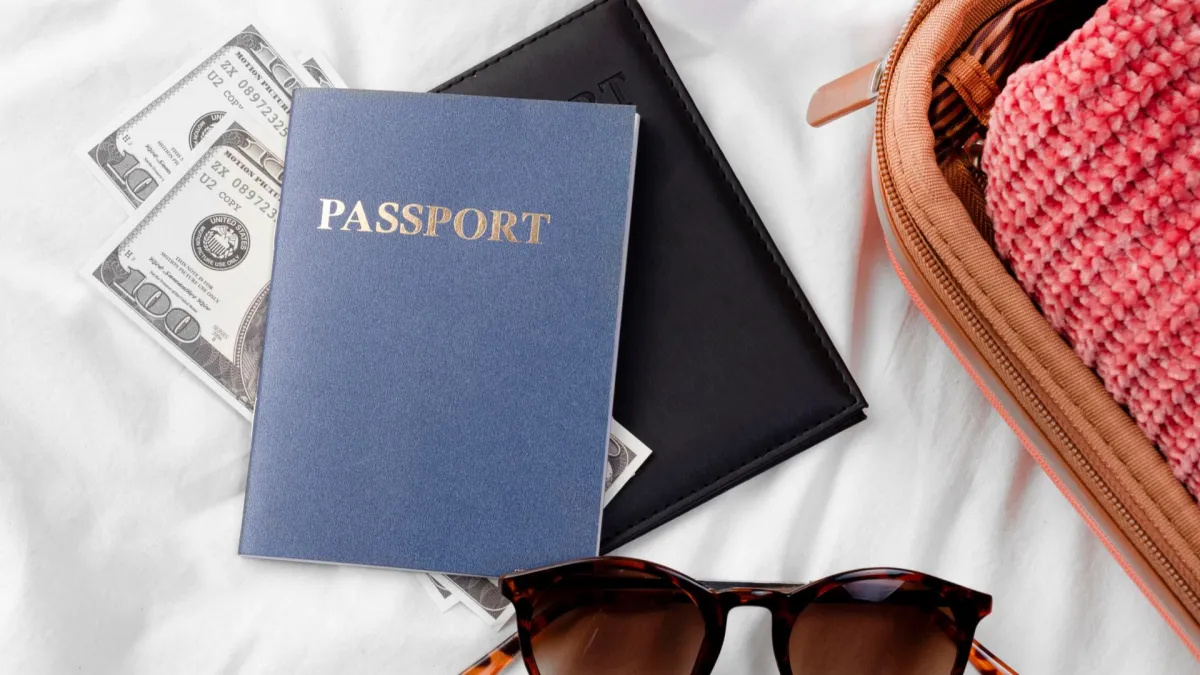
Foreigners wishing to enter Thailand must apply for a visa from the embassy or consulate general of Thailand located in the country of their residence or from the Thai embassy assigned to oversee the country in which they reside. Visa processing is subject to visa service fees for each type of visa, as follows:
- Transit Visa: 800 baht;
- Tourist Visa: 1,000 baht;
- Non-Immigrant Visa (Single): 2,000 baht;
- Non-Immigrant Visa (1-Year Multiple): 5,000 baht;
- Non-Immigrant Visa (3-Year Multiple) for persons holding a passport or other document in lieu of an Asia-Pacific Economic Cooperation member's passport and traveling into the Kingdom for operating business;
- Immigrant Visa: 1,900 baht;
- Non-Quota Immigrant Visa: 1,900 baht for Single and 3,800 baht for Multiple.
Source: Immigration Division 1
Tel. 0 2141 9889, 081 412 9180
Most Popular

How to buy train tickets online

Thailand Biggest Fair 2023 (6-14 May)

Travel calendar – Pilates Day Thailand 2023 (6-7 May 2023)

Travel calendar – Beauty and the Beast in concert (20-21 May 2023)
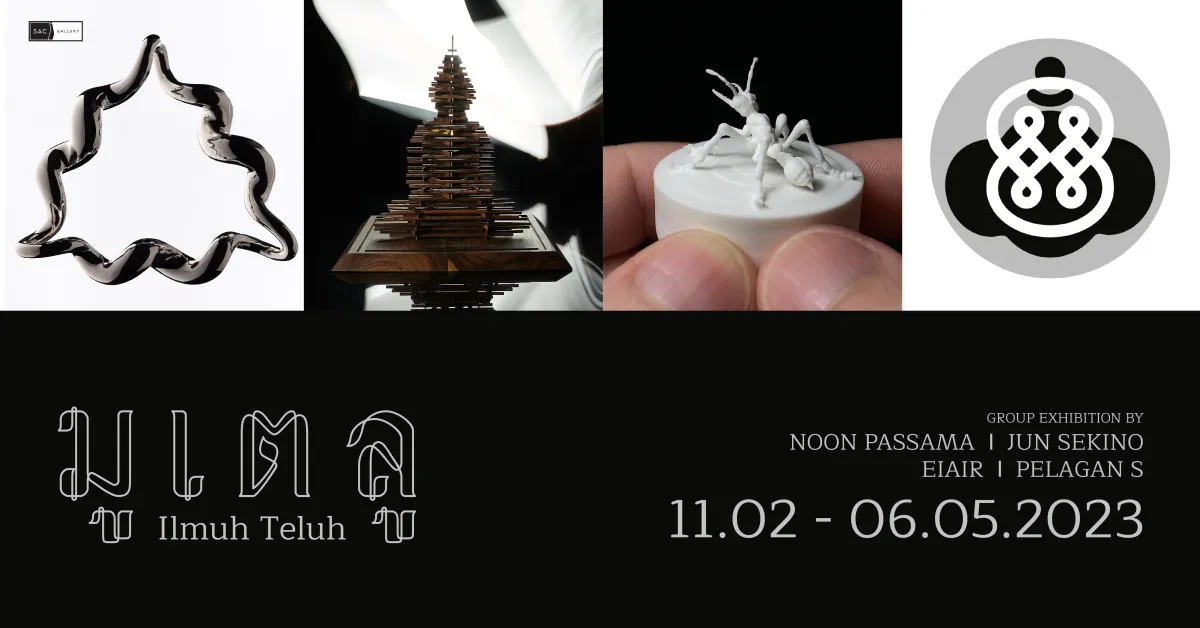
Travel calendar –“Ilmu Teluh” art exhibition (Till 6 May 2023) (May)

Bringing Thai or foreign currency into or out of the Kingdom
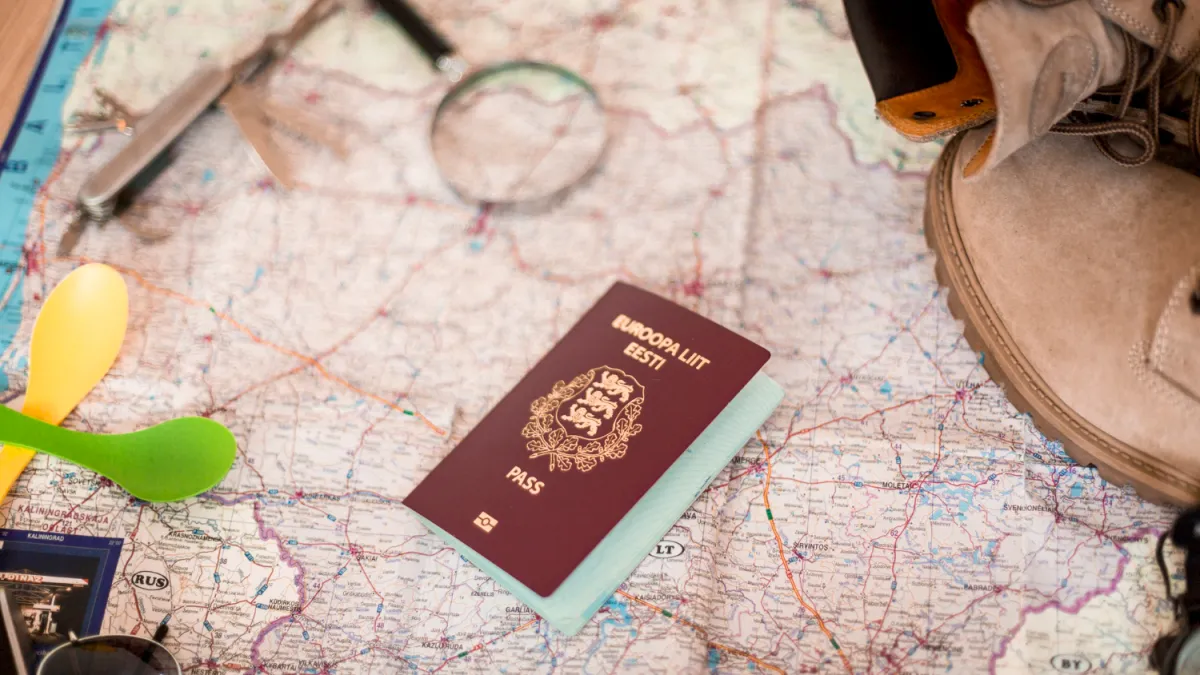
Countries/Territories entitled for visa exemption for a visit of not exceeding 30 days
Consular Services
- Consular Information
- Important Information on Visa Application
- Additional Requirements for Non-Indonesian Applicants
- Tourist Visa
- Transit Visa
- Non-immigrant visa “B”
- Non-immigrant visa “ED”
- Non-Immigrant visa “M”
- Non-immigrant visa “F”
- Non-immigrant visa “O”
- LONG-TERM RESIDENT (LTR) VISA
- Non-immigrant visa “O-A” (Long stay)
- Non-immigrant visa “O-X” (Long stay)
- Visa on Arrival
- Legalization
Tourist Visa (TR) may be granted to visitors who intend to stay in Thailand no longer than 60 days for tourism purpose
Types of Tourist Visa and Validity:
- Single-Entry Tourist Visa: valid for entering Thailand once within 3 months from the date of issue. The period of stay is 60 days maximum.
- Multiple-Entry Tourist Visa: valid for entering Thailand within 6 months from the date of issue. The period of stay is 60 days maximum per stay per entry. The Multiple-Entry Tourist Visa holder may enter Thailand again as long as the visa is still valid. Multiple-Entry Tourist Visa will only be granted to Indonesian nationals or applicants with KITAS or KITAP.
Required documents:
- Visa Application form(s) and photograph(s): Completed and signed Visa Application form and 2 recent photographs (size 3.5×4.5 cm). Non-Indonesian applicants may be required to submit more than one set of application forms. (See: Additional Requirements for Non-Indonesian Applicants )
- Passport (valid for no less than 6 months)
- Booked travel tickets in and out of Thailand
- Single-Entry Tourist Visa: Bank Statement showing at least THB 20,000 per person or THB 40,000 per family or equivalent in other currencies.
- Multiple-Entry Tourist Visa: Bank Statement showing at least IDR 80,000,000 (USD 7,000) for the past 6 months, and Letter of Employment
- Booked Hotel, or Letter of invitation from Accommodation and Accomodation Owner’s Thai ID Card, covering duration of stay within Thailand
- Copy of Temporary Resident Permit (KITAS) or Permanent Resident Permit (KITAP), if any. (Compulsory for Multiple-Entry Tourist Visa applicants)
- Single-Entry Tourist Visa: IDR 560,000 *
- Multiple-Entry Tourist Visa: IDR 2,800,000
Consular officers reserve the right to request additional documents, or an interview with the applicant, as deemed necessary, without prior notice.
The Royal Thai Embassy reserves the right to refuse visa to applicant with insufficient documents or if the reasons given are not fully supported. The visa fee is non-refundable.
========================
Special Tourist Visa (STV) – for Indonesians, or foreign citizens with permanent residence in Indonesia. (STV visa single entry valid for 90 days, extendable twice in Thailand)
– Visa Application form(s) and photograph(s): Completed and signed Visa Application form and 2 recent photographs (size 3.5×4.5 cm). Non-Indonesian applicants may be required to submit more than one set of application forms. (See: Additional Requirements for Non-Indonesian Applicants ) – Passport validity not less than 12 months – Permanent Resident Permit (KITAP) in Indonesia – Police Record verifying that the applicant has no criminal record in Indonesia (issued no more than 3 months prior) – Medical Certificate issued by local competent authority certifying that the applicant has no prohibited diseases as indicated in the Ministerial Regulation No. 14 (B.E. 2535) (the certificate must be issued no more than 3 months prior) (http://www.thaiembassyjakarta.com/wp-content/uploads/pdf/medical-certificate.pdf) – Health insurance policy covering the entire intended period of stay in Thailand with Outpatient benefit coverage insured not less than THB 40,000 and Inpatient benefit coverage insured not less than THB 400,000 or equivalent in other currencies. (Further information at http://longstay.tgia.org) – Evidence of accommodation for the whole duration of stay in Thailand after quarantine period: – Proof of fully-paid hotel or accommodation (issued by legitimate entrepreneur with tax identification number), or – Proof of condominium ownership in Thailand, or – Proof of condominium lease contract with a copy of owner’s ID card, signed by the owner and proof of payment, or – Proof of purchase/hire purchase of condominium in Thailand which shows that not less than 25% of the full amount has been paid. – Applicant’s spouse and children (under 20 years old) are eligible to travel together and must show a copy of marriage certificate/birth certificate
Royal Thai Embassy, Jakarta
JI. DR Ide Anak Agung Gde Agung kav. NO. 3.3 (Lot 8.8), Kawasan Mega Kuningan, Jakarta Indonesia 12950.
Tel. +62 21 2932 8190-94 Fax. +62 21 2932 8199, +62 21 2932 8201, +62 21 2932 8213
So kannst du dein Thailand-Visum beantragen (2024)
Hier findest du alles Wissenswerte rund um deine Einreise nach Thailand. Ob Visa on arrival, Kosten, Antragszeit, Visa-Run, Voraussetzungen oder die Einreise auf dem Landweg – die Antworten auf die wichtigsten Fragen habe ich in diesem Artikel zusammengestellt.
Inhaltsverzeichnis
Thailand: Einreise & Corona
Thailand-urlaub: einreise ohne visum, thailand: wann und wie oft kann ich ohne visum einreisen, benötige ich bei der einreise nach thailand ein rückreise/weiterreise-ticket, visum on arrival in thailand möglich, einreisekarte für thailand, wichtige hinweise zu deinem reisepass, thailand-visum beantragen: welche unterlagen sind nötig, thailand-visum online beantragen / e-visum, tourist visa (single entry), tourist visum (multiple entry), non-immigrant-visum “o” (single entry oder multiple entry), welches visum brauche ich auf geschäftsreise / im praktikum / im auslandssemester, thailand-visum für kinder, thailand-visum für rentner, thailand: alles zu wiedereinreise, mehrfache einreise und zwischenstopps, alle infos zu den kosten für dein thailand-visum, thailand-visum beantragen: dauer der bearbeitung, einreise thailand: wie viel bargeld muss ich dabeihaben, auf kreuzfahrt in thailand: wird ein visum benötigt, wie kann ich mein thailand-visum verlängern, was ist ein visa run, aufenthaltsrecht/visa überziehen, einreise nach thailand über land, visum über eine agentur, einreisebestimmungen, in deutschland, österreich und der schweiz, botschaften/konsulate in thailand.
Wenn du nach Thailand reisen möchtest, hast du die Wahl zwischen einer Vielzahl von Einreisemöglichkeiten. Welche Option die beste für deinen Aufenthalt in Thailand ist, erfährst du in diesem Beitrag.
Nachfolgend kannst lernst du die verschiedenen Arten von Visa kennen. Zudem erklären wir, welche Visa derzeit ausgestellt werden und wie du ohne Visum einreisen kannst.
Beachte: Die Einreisebestimmungen können sich jederzeit ändern. Der Stand der Informationen in diesem Artikel ist von April 2024. Alle Infos werden regelmäßig überprüft. Trotzdem sind die Angaben ohne Gewähr. Rechtsverbindliche Auskünfte gibt es nur direkt bei den Botschaften. Sollten dir Änderungen auffallen, freuen wir uns über eine kurze Nachricht. Du hilfst damit uns und anderen Reisenden.
Seit dem 1. Oktober 2022 kannst du wieder ohne großen Papier- und Nervenaufwand nach Thailand einreisen. Es wird zudem weder ein Impfnachweis noch ein Testergebnis benötigt. Auch ein COE (Certificate of entry) oder den Thailand-Pass musst du nicht mehr beantragen. Sozusagen ist die Einreise nach Thailand nun wieder recht einfach gehalten – in den meisten Fällen. Alles was du für den Grenzübertritt benötigst, erfährst du nachfolgend
Thailand: Visum & Einreise (2024)
Egal, ob du dich für Backpacking in Thailand oder einen Pauschalurlaub interessierst, ob du eine unvergessliche Thailand-Rundreise buchen möchtest oder die Teilnahme an einer Thailand-Gruppenreise planst: Zuallererst musst du dich mit dem Thema Visum/Einreise auseinandersetzen.
Die gute Nachricht: Für Reisende aus Deutschland, Österreich und der Schweiz ist die Einreise bei einem Aufenthalt von maximal 30 Tagen eine sehr einfache Angelegenheit.
Um die schönsten Ziele Thailands zu besuchen, erhältst du am Flughafen einen Stempel in deinen Reisepass und darfst einreisen. Bei Einreise auf dem Land- oder Wasserweg musst du zusätzlich eine Einreisekarte ausfüllen.
Die thailändische Regierung hat die Ausfüllpflicht des Einreiseformulars „TM6″ für ausländische Reisende an 16 Land- und Seekontrollstellen vom 15. April bis 15. Oktober 2024 ausgesetzt.
Möchtest du länger bleiben, benötigst du ein Visum. Zudem kannst du deine Aufenthaltserlaubnis vor Ort verlängern lassen.
Ausführliche Infos rund um die Einreise nach Thailand findest du im nachfolgenden Artikel. Weitere wichtige Themen im Rahmen deiner Reisevorbereitung sind die Reisekrankenversicherung , eine gute Reisekreditkarte und gesundheitliche Vorsorge ( Impfungen für Thailand ).
Reisende u.a. aus Deutschland, Österreich und der Schweiz können 30 Tage ohne Visum im thailändischen Königreich verbringen. Somit ist für dich, sofern du einen Pass aus einem der genannten Länder hast, eine visumfreie Einreise möglich. Du erhältst bei den Einreise einen Stempel „Exempt Stamp“ in den Pass und kannst anschließend bis zu 30 Tage im Land bleiben.
Der Nachweis einer Reisekrankenversicherung wird nicht mehr verlangt, wir empfehlen diese jedoch weiterhin. Gleiches gilt für eine Reiserücktrittsversicherung.
Wichtig zu wissen: Dieser Stempel im Pass ist kein Visa on Arrival, auch, wenn er manchmal so genannt wird. Deshalb stell dich am Flughafen nicht am „Visa on Arrival“-Schalter an, sondern gehe einfach direkt zur Immigration-Halle. Dort kontrollieren die Beamten deine Papiere und machen für ihre Datenbank ein Foto von dir. Die Prozedur geht in der Regel recht zügig vonstatten. Danach kannst du dein Gepäck in Empfang nehmen.
Der visafreie Aufenthalt kann in einem Immigration Office in Thailand einmal um 30 Tage verlängert werden (Kosten: 1.900 Baht).
Die Immigration Office-Standorte findest du hier .
Eine visafreie Einreise ist mehrmals im Jahr möglich. Der Gesamtaufenthalt innerhalb von sechs Monaten darf 90 Tage offiziell jedoch nicht überschreiten. Wie es letzten Endes tatsächlich am Flughafen gehandhabt wird, dazu erhalten wir unterschiedliche Berichte.
Beachte, dass dein Reisepass am Tag der Einreise noch mindestens sechs Monate gültig sein muss.
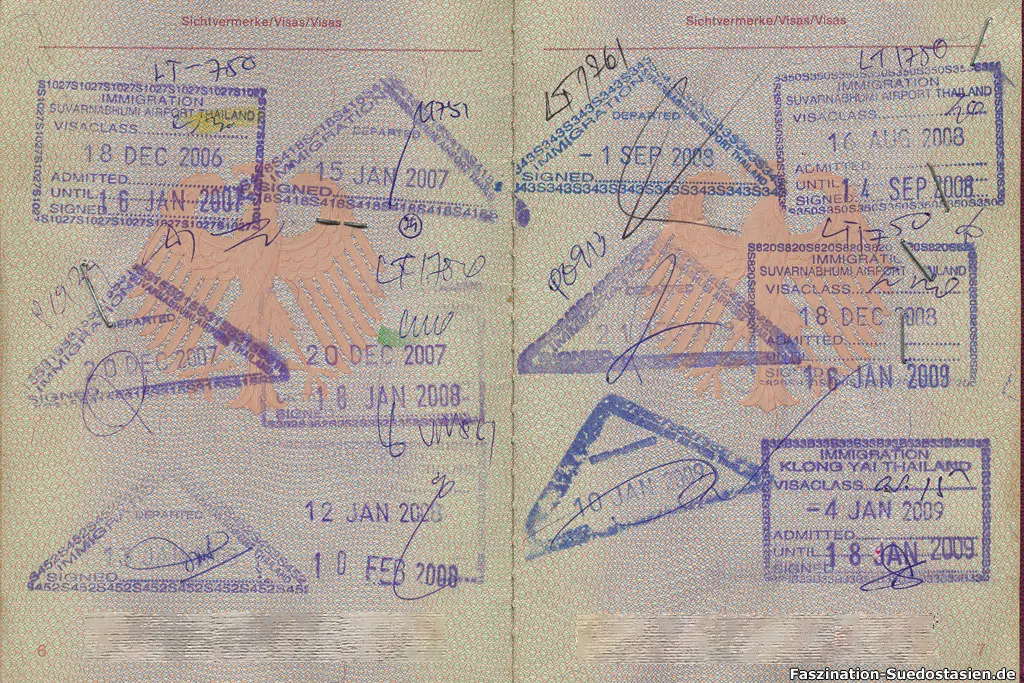
Die 30-tägige Einreiseerlaubnis darfst du offiziell so oft in Anspruch nehmen, wie du möchtest. Bitte beachte jedoch, dass ein Gesamtaufenthalt von 90 Tagen innerhalb von 6 Monaten (ab dem ersten Einreisetag) nicht überschritten werden darf. Falls du einen längeren Aufenthalt planst, so musst du vorab ein Visum beantragen.
Zudem ist die Anzahl der Einreisen auf dem Land- oder Seeweg auf zwei pro Jahr begrenzt, schreibt das thailändische Honorarkonsulat in Hamburg. Dies gilt auch sowohl für Staatsbürger aus Österreich und der Schweiz.
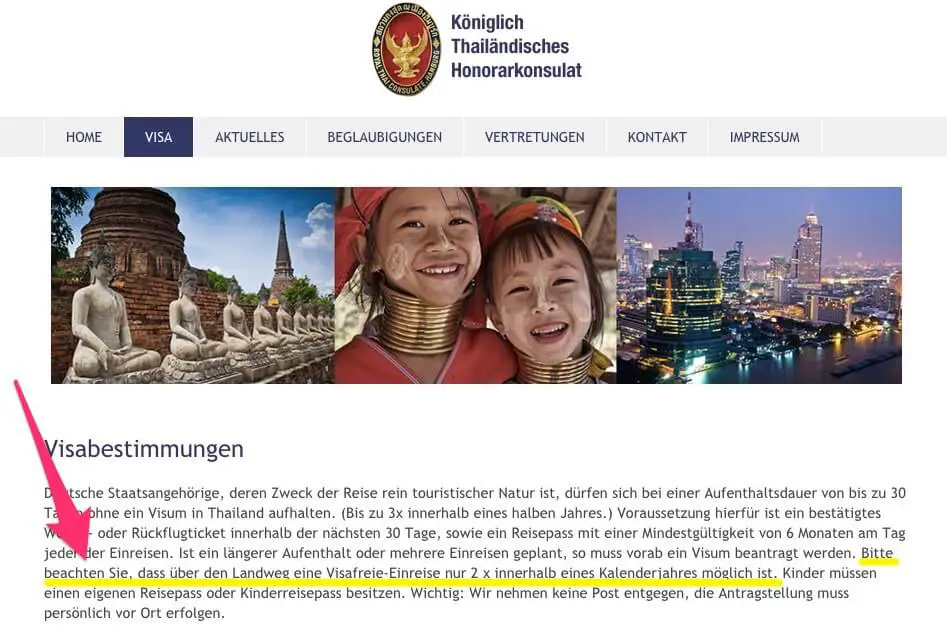
Da die visumsfreie Einreise in der Vergangenheit durch so genannte Visa-Runs oft missbraucht worden ist, kann es sein, dass dir die Grenzbeamten irgendwann die Einreise verweigern, wenn du in zu kurzen Abständen für 30 Tage einreist.
Schon häufiger haben Reisende berichtet, dass beim Check-in am Flughafen in Deutschland ein solches Ticket verlangt wurde.
Und auch das Thailändische Konsulat in Hamburg weist darau f hin. Demnach musst du, sofern du mit einem One-Way-Ticket nach Thailand reist, in der Lage sein, deine Ausreise nachzuweisen.
Reisende ohne konkreten Reiseplan nutzen immer häufiger sogenannte Onward-Tickets , um Probleme bei der Einreise zu vermeiden.
Es gibt unterschiedliche Meinungen/Erfahrungen, ob der Nachweis statt durch eine Flugbuchung auch durch ein Bus- oder Bahnticket erbracht werden kann.
Gleiches gilt für Hotelreservierungen oder Visa für Nachbarländer. Beides wurde in der Vergangenheit gelegentlich als Nachweis akzeptiert, es gibt aber keine Garantie, dass dies funktioniert.
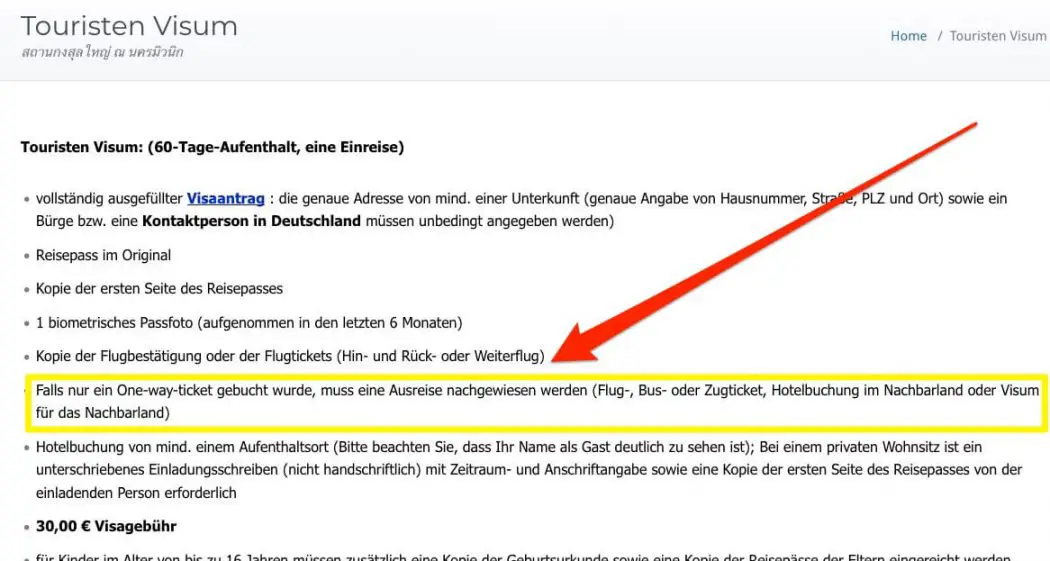
Ein richtiges Visa on Arrival gibt es zwar für einige Nationalitäten, für Deutsche, Österreicher und Schweizer ist es aber nicht relevant. Möchtest du länger als 30 Tage in Thailand bleiben, musst du dein Visum vorab bei der Thailändischen Botschaft oder bei einem der Konsulate beantragen. Bei einem Aufenthalt unter 30 Tagen bekommst du kein Visum, sondern durch einen einfachen Stempel im Pass eine Einreiseerlaubnis. Diese Einreiseerlaubnis kann vor Ort um weitere 30 Tage verlängert werden.
Das Einreiseformular, bestehend aus Arrival und Departure Card, wurde 2022 abgeschafft. Dies gilt jedoch nur für die Einreise mit dem Flugzeug. Wer auf dem Land- oder Seeweg nach Thailand einreist, muss weiterhin das Formular TM6 ausfüllen.

Ganz wichtig zu wissen ist, dass dein Reisepass bei der Einreise nach Thailand noch mindestens sechs Monate gültig sein muss – egal, ob du mit oder ohne Visum reist. Auch bei einer verbleibenden Gültigkeit von fünfeinhalb Monaten wird dir in jedem Fall die Einreise verweigert, darauf weist die thailändische Botschaft explizit hin. Ist dein Reisepass so gut wie abgelaufen und reicht die Zeit nicht mehr, um einen neuen zu beantragen, wird auch ein vorläufiger Reisepass akzeptiert.
Übrigens: Hast du ein Visum mit mehrfacher Einreise, muss der Reisepass am Tag der letzten Einreise noch mindestens sechs Monate gültig sein.
Die verschiedenen Visa für Thailand
Neben der visafreien Einreise gibt es zwei verschiedene Touristen-Visa, beide sind 60 Tage gültig. Das einfache berechtigt dich zur einmaligen Einreise. Du kannst zwischen dem einfachen Touristen Visum (TR) wählen, das dich zur einmaligen Einreise berechtigt. Oder du entscheidest dich für ein Touristen Visum (TR) mit Möglichkeit der mehrfachen Einreise binnen 6 Monaten. Beide Visa haben nun denselben Namen (früher Tourist Visa und Tourist Visa M)
Nur bestimmte Personengruppen (Rentner, Ehepartner und Kinder von thailändischen Staatsangehörigen, ehemalige thailändische Staatsbürger und Personen, die Freiwilligendienst leisten) können das „Non-Immigrant-Visa“ für 90 Tage beantragen, welches ebenfalls in den Varianten einfache/mehrfache Einreise erhältlich ist.
Rentner können darüber hinaus unter bestimmten Voraussetzungen einen 365-Tage-„Longstay“ beantragen. Studenten, unbezahlte Praktikanten und (Sprach-)Schüler hingegen beantragen das „Non-Immigrant-Visa ED“ für die Aus- und Weiterbildung, welches ebenfalls 90 Tage gültig ist.
Weiterhin gibt es Business-Visa für 90 Tage, sowohl für Geschäftsreisende als auch für bezahlte Praktikanten. Darüber hinaus gibt es Medien-Visa für Filmproduzenten, Journalisten und Berichterstatter.
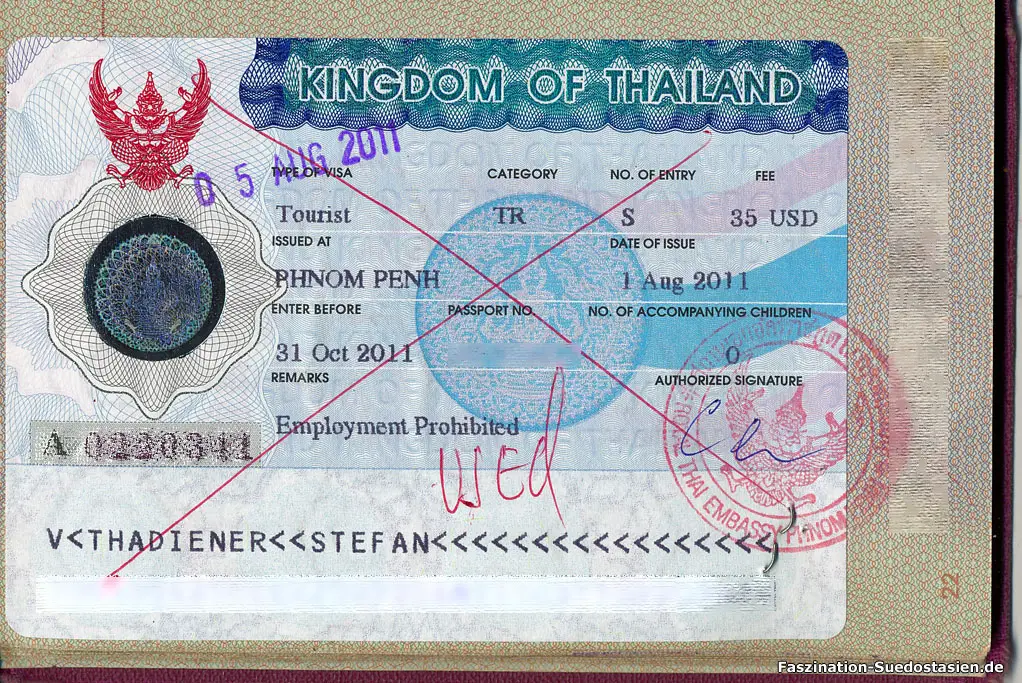
Seit dem 22. November 2021 gibt es ausschließlich die Möglichkeit, dein Visum online zu beantragen. Du kannst also nicht mehr wie noch vor einiger Zeit deinen Reisepass plus Unterlagen zum Konsulat schicken. Mit dem E-Visum geht die Prozedur schneller und einfacher, zudem kannst du den Status der Genehmigung immer mal wieder online checken, statt auf den lang ersehnten Brief zu warten.
Auf der offiziellen Internetseite thaievisa.go.th kannst du dein E-Visum beantragen.
Für eine 30-tägige Einreiseerlaubnis brauchst du nur deinen Reisepass, (offiziell) dein Rückflug- oder Weiterreise-Ticket und deine ausgefüllte Arrival-/Departure-Card.
Für ein TR-Visum sind weitere Unterlagen / Nachweise wie folgt aufgeführt:
- Vollständig ausgefüllter Visa-Antrag inkl. Adresse einer Unterkunft in Thailand und Kontaktperson in Deutschland
- Foto der Personaldatenseite deines Reisepasses
- Aktuelles Passbild
- Unterkunftsnachweis für dein Hotel in Thailand
- Reisenachweise: Kopie der Flugbestätigung oder des Tickets, insbesondere Bestätigung der Aus- oder Weiterreise durch Flug-, Zug-, Bahn- oder Busticket
- Finanzielle Nachweise, z.B. Kontoauszug mit einem aktuellen Kontostand von mindestens 500 EUR
- Personalausweis (Vorder-/Rückseite) oder Meldebestätigung (nicht älter als 6 Monate) zur Bestätigung deines Wohnsitzes
Zusätzlich zum Single-Entry-Touristenvisum:
- Vermögensnachweis in Höhe von 1.500 € anhand eines Kontoauszuges pro Monatesende der letzten 3 Monate
Hier kannst du nochmals alle geforderten Unterlagen im Detail nachlesen.
Diese Art von Visum erlaubt eine maximale Aufenthaltsdauer von 90 Tagen und ist erhältlich für alle Staatsbürger ab 50 Jahren, Ehepartner und Kinder von thailändischen Staatsangehörigen und Personen, die in Thailand einen Freiwilligendienst absolvieren. Auch hier gibt es die einmalige oder mehrmalige Einreise zur Auswahl.
Es sind die gleichen Unterlagen wie beim Touristenvisum einzureichen, plus zusätzlich:
- Als Rentner muss ein Monatseinkommen (=Rentenbescheid) von mindestens 1.700 € netto nachgewiesen werden, alternativ ein Barvermögen von mindestens 20.000 € Saldo pro Monatsende der letzten 3 Monate
- Ehepartner von thailändischen Staatsangehörigen müssen eine Kopie der Heiratsurkunde vorlegen
- Kinder von thailändischen Staatsangehörigen müssen eine Kopie der Reisepässe ihrer Eltern vorweisen
- Kopien des Reisepasses mit den Reiseaufzeichnungen der letzten 12 Monate seit der letzten Auslandsreise
- Freiwilligendienstleistende müssen ihre Tätigkeit nachweisen, dafür benötigen sie ein an die thailändische Botschaft gerichtetes Schreiben mit Angabe ihrer Tätigkeit, sowie einen Registerauszug der Organisation/des Unternehmens. Außerdem muss der Nachweis über eine Auslandskrankenversicherung erbracht werden, sowie auf Verlangen finanzielle Absicherung.
Geschäftsreisende und bezahlte Praktikanten benötigen ebenfalls ein 90 Tage Non-Immigrant-Visum in der Variante „B“ wie „Business“, erhältlich für Single- oder Multiple-Entry. Eingereicht werden müssen hierfür folgende Unterlagen:
- Vollständig ausgefüllter Visa-Antrag inkl. Adresse einer Unterkunft und Kontaktperson in Deutschland
- Kopie der ersten Seite deines Reisepasses
- Kostenübernahmeerklärung deines deutschen Arbeitgebers mit Angabe des Aufenthaltszeitraumes (entfällt bei Praktikanten)
- Einladungsschreiben der thailändischen Firma mit Angaben zu deiner Tätigkeit und zur Länge deines Aufenthalts
- Bei einer Anstellung als Lehrer benötigst du zusätzlich ein Führungszeugnis
- Machst du ein bezahltes Praktikum, ist zusätzlich dein Praktikumsvertrag einzureichen
Für Studierende, (Sprach-)Schüler und unbezahlte Praktikanten gibt es das Aus- und Weiterbildungsvisum „Non-Immigrant-ED“, erhältlich für Single- oder Multiple-Entry für 90 Tage. Eingereicht werden müssen hierfür folgende Unterlagen:
- Ein Schreiben der Schule / Sprachschule / Universität an die thailändische Botschaft mit deiner Aufnahmebestätigung, welches vom jeweiligen Leiter der Fakultät unterschrieben sein muss
- Bei unbezahlten Praktikanten wird ein Einladungsschreiben der thailändischen Firma mit Angaben zu deiner Tätigkeit und zur Länge deines Aufenthalts benötigt, sowie dein Praktikumsvertrag
Auch Kinder benötigen bei einem Aufenthalt von über 30 Tagen ihr eigenes Visum. Ist dein Kind unter 15 Jahre alt, muss bei der Antragsstellung zusätzlich eine Kopie der Geburtsurkunde, sowie Kopien der Reisepässe der Eltern, vorgelegt werden.
Tipp: Füge bei den finanziellen Nachweisen einfach die Kontoauszüge der Eltern ein. Dein Kind arbeitet schließlich noch nicht, dennoch sind dieselben Dokumente hochzuladen, wie bei Erwachsenen.
Der deutsche Kinderreisepass wird in jedem Fall von den thailändischen Behörden als Reisedokument akzeptiert.
Unter 30 Tagen gelten dieselben Voraussetzungen wie bei den Eltern. Kinder benötigen in jedem Fall einen eigenen Reisepass.
Achtung! Der deutsche Kinderausweis wird nicht akzeptiert. Es muss daher unbedingt ein Kinderreisepass mitgeführt werden. Auch dieser muss bei der Einreise noch mindestens 6 Monate gültig sein.
Für Rentner oder für Staatsbürger ab 50 Jahren, gibt es die Möglichkeit, ein „Non-Immigrant-Visum O Retirement“ zu beantragen, siehe Abschnitt über Visa-Unterlagen.
Darüber hinaus gibt es für Rentner (ab 50 Jahren) die Möglichkeit, einen „Longstay“ (Jahresvisum) zu beantragen. Dies ist unter hohen Auflagen (ausreichend Barvermögen, Krankenversicherung, des polizeilichen Führungszeugnisses sowie eines Gesundheitszeugnisses und des Nachweises über einen Wohnraum in Thailand) ebenfalls online erhältlich.
Visa-Bestimmungen & Hinweise
Ob dir eine Mehrfacheinreise innerhalb deines Visumszeitraums genehmigt ist, hängt vom Visum ab. Die unterschiedlichen Visa sind im Wesentlichen nach Single-Entry und Multiple-Entry unterschieden, daher gestatten einige Visa eine Mehrfacheinreise ausdrücklich. Es hängt von Art und Länge deiner Reise ab, was für dich Sinn ergibt.
Bei Zwischenstopps in Bangkok kommt es darauf an, ob du die Transitzone verlässt, um dir z.B. die Stadt anzuschauen. Wenn nicht, hast du mit der Immigrationsprozedur nichts zu tun, weil du dich nur im Transit-Bereich des Flughafens aufhältst. Verlässt du diese, durchläufst du den normalen Einreiseprozess mit Passkontrolle, Einreisestempel und Gepäckabholung. Das gilt im Übrigen auch dann, wenn du zwar direkt vom gleichen Flughafen weiterfliegst, deine Flüge aber getrennt gebucht hast.
Die Wiedereinreise mit deiner 30-tägigen Aufenthaltserlaubnis ist theoretisch kein Problem, sollte aber nicht zu oft bzw. in zu kurzen Abständen praktiziert werden. Irgendwann fällt das in die Kategorie „Visa Run“, und dagegen sind die thailändischen Behörden seit einiger Zeit allergisch. Vor einigen Jahren war der Visa Run Gang und Gäbe, da aber deshalb die Zahl der unautorisierten Langzeit-Touristen explodiert ist, setzt die thailändische Regierung seit 2014 ihre Visums- und Einreisebestimmungen sehr viel strenger um.
Die 30-tägige Einreiseerlaubnis kostet dich nichts, bei der Beantragung eines E-Visums hingegen fallen folgende Gebühren an:
- Tourist Visa (Single Entry): 35 €
- Tourist Visa M (Multiple Entry): 175 €
- Non-Immigrant-Visa (Single Entry): 70 €
- Non-Immigrant-Visa (Multiple Entry): 175 €
Die Bearbeitungszeit eines Visums ist dank der Umstellung auf Online-Beantragung deutlich schneller und praktischer. Du kannst mit deiner Genehmigung normalerweise innerhalb einer Woche rechnen, manchmal etwas länger oder auch schneller.
Es ist in jedem Fall besser, dein Visum nicht erst auf den letzten Drücker zu beantragen, sondern etwas Puffer einzuplanen. Gibt es noch Beanstandungen oder fehlt etwas, kannst du das problemlos in einer aufgeforderten E-Mail nachreichen..
Vor einiger Zeit hat die Nachricht über Touristen, denen die Einreise nach Thailand aufgrund von fehlendem Bargeld verweigert wurde, für Angst und Schrecken gesorgt. Und ja, die offizielle Aussage der thailändischen Botschaft in Berlin lautet, dass Reisende ohne Visum 10.000 Baht, als Familie 20.000 Baht, und mit Visum bis zu 40.000 Baht mit sich führen müssen (auch in anderen Währungen). Soweit das offizielle Statement.
In der Praxis ist es eher selten der Fall, dass bei Touristen die Geldmittel überhaupt kontrolliert werden, geschweige denn die Einreise deshalb verweigert wird. Aber im Rahmen eines Worst-Case-Szenarios sollte man im Stande sein, die Geldmittel zumindest vom Konto abzuheben. Allerdings muss dann auch ein Geldautomat vorhanden sein, was nicht überall der Fall ist.
Das kommt darauf an, wie lange du bleibst – da aber wohl die wenigsten Kreuzfahrten einen Zwischenstopp über 30 Tage in Thailand machen, bewegst du dich im Rahmen der visafreien Aufenthaltserlaubnis und brauchst nur deinen Reisepass. Bist du unsicher, kontaktiere deinen Kreuzfahrt-Anbieter, der weiß genau, was zu tun ist. In der Regel kümmert sich die Crew darum, dass alle Passagiere ihre Einreiseerlaubnis erhalten.
Die Verlängerung deiner 30-tägigen Aufenthaltserlaubnis und deines Touristenvisums ist bei den offiziellen Immigrations-Büros möglich, beides kannst du einmalig um 30 Tage verlängern. Das bedeutet, dass du im Falle einer behördlichen Genehmigung mit einer Aufenthaltserlaubnis bis maximal 60 Tage in Thailand bleiben kannst, und mit einem Touristenvisum 90 Tage. Die Genehmigung ist Formsache und überhaupt nicht kompliziert, wenn du alle erforderlichen Unterlagen mitbringst. Für eine Verlängerung deines Visums brauchst du:
- deinen Reisepass
- eine Kopie der ersten Seite deines Reisepasses
- ein Passfoto
- eine Kopie deiner Departure Card
- und, sofern du eins hast, eine Kopie deines Touristenvisums
Im Immigration Office liegen so genannte TM-Formulare aus, von denen du eins ausfüllst und zusammen mit deinen Unterlagen und 1.900 Baht Gebühr einreichst. Oftmals stehen vor Ort Kopierer für eine geringe Gebühr bereit, falls du das ein oder andere Dokument noch kopieren musst. Die Bearbeitung kann im schlimmsten Fall ein paar Stunden dauern, komme also besser nicht erst kurz vor Feierabend.
Ein Visa-Run bezeichnet das Überqueren der Landesgrenze für einen kurzen Zeitraum, um bei der Rückkehr wieder eine volle Aufenthaltsgenehmigung zu haben. Im Fall von Thailand war dies vor einigen Jahren noch gängige Praxis, um die 30-tägige Aufenthaltsgenehmigung wieder und wieder zu bekommen. Dem wird seit 2014 jedoch stark Einhalt geboten, so dass du ggf. darauf achten solltest, das passendende Visum für deine Reise zu beantragen.
Beim Überziehen des Visums oder des Aufenthaltsrechts ist mit den thailändischen Behörden nicht zu spaßen! Zwar gibt es immer wieder Berichte, dass ein Überziehen von wenigen Tagen nur – für unsere Verhältnisse – niedrige Geldbußen nach sich zieht. Aber eine Garantie dafür gibt es nicht. Ein sogenannter Overstay kann neben Geldstrafen auch Einreiseverbote von bis zu 10 Jahren nach sich ziehen. Und hier reden wir von einem Szenario, in dem du dich selber den Behörden stellst. Erwischt dich die Polizei mit einem abgelaufenen Visum, kann (im schlimmsten Fall) auch eine Gefängnisstrafe eine mögliche Konsequenz sein. Deshalb lass es besser nicht drauf ankommen und halte dich an die geltenden Einreisegesetze.
Thailand hat viele Grenzübergänge zu Nachbarländern, die genau wie Flughäfen zur Einreise genutzt werden können. Einige sind recht bekannt und stark durch z.B. Reisebusse frequentiert, wie z.B. Poipet (Grenzübergang zu Kambodscha) oder Mae Sot (Grenzübergang zu Myanmar), es gibt aber viele mehr. Die Einreiseprozedur läuft hier nicht anders als am Flughafen, entweder bekommst du deinen Stempel in den Pass oder musst dein Visum vorzeigen. Manchmal findest du im Internet die Informationen, dass dir bei einer Einreise über Land nur 15 Tage Aufenthalt gewährt werden. Diese Information ist veraltet, auch per Land- oder Seeweg darfst du 30 Tage visafrei in Thailand bleiben. Allerdings ist die Einreise über Land nur zweimal pro Kalenderjahr gestattet (siehe oben).
Überblick verloren? Visum-Agenturen helfen! Wenn du keine Lust hast, dich selber mit den Behörden auseinanderzusetzen, oder vielleicht Angst hast, etwas falsch zu machen oder dir Zeit dafür fehlt, helfen diverse Visa-Agenturen. Erprobte Anbieter wie Visabox sind Experten und listen dir haarklein alle benötigten Unterlagen auf und übernehmen die Beantragung deines Visums.
Nachdem du nun so ziemlich alles über die Visa-Bestimmungen weißt, ein paar Worte zu den sonstigen Einreisebestimmungen:
Thailand ist kein Land mit besonders strengen oder beachtenswerten Zollbestimmungen. Ausländische Devisen und thailändische Baht dürfen ohne Begrenzung ein- und ausgeführt werden, erst ab einem Gegenwert von 15.000 Dollar müssen diese beim Zoll deklariert werden. Beim Souvenirkauf ist zu beachten, dass du die Ausfuhr von Antiquitäten vorher genehmigen lässt – dies betrifft jedoch nur echte Antiquitäten, keinen Nachtmarkt-Nippes oder Kunsthandwerk. Meiden solltest du Souvenirs, die dem Washingtoner Artenschutzabkommen unterliegen, also z.B. Lederprodukte von Elefant, Krokodil oder Schlange. Zigaretten dürfen bis zu 200 Stück pro Person eingeführt werden, das Mitbringen von E-Zigaretten ist komplett verboten.
Drohnen-Fotografen aufgepasst! Das Mitführen von Drohne ist zwar gestattet, die Inbetriebnahme muss jedoch bei der Civil Aviation Authority of Thailand (CAAT) angemeldet werden. Dies ist über ein Formular möglich, setze dich dazu aber am besten kurz mit der Behörde in Verbindung . Für die anschließende Genehmigung müssen derzeit mehrere Monate eingeplant werden. Wenn du die Drohne ohne Genehmigung fliegen lässt, drohen (hohe) Strafen.
Bist du auf psychotrope Medikamente (Psychopharmaka wie Antidepressiva oder Neuroleptika) oder auf eine Behandlung mit Betäubungsmitteln (z.B. Codeine oder Moprhine) angewiesen, beachte unbedingt den Leitfaden der thailändischen Botschaft. Auf der Website der thailändischen Narcotics Control Divison erfährst du ebenfalls mehr über das Thema.
Botschaften & Konsulate
Thailand ist eines der wenigen Länder, welches neben der Botschaft ganz fünf Konsulate in Deutschland betreibt. Davon sind allerdings nur noch München, Frankfurt und Berlin befugt, ausländischen Staatsbürgern ein Visum für die Einreise in das Königreich Thailand auszustellen (online zu genehmigen) sowie jegliche Dokumente im Namen der Honorarkonsuln des Königreichs Thailand zu beglaubigen.
Thailändische Botschaft in Berlin Lepsiusstraße 64/66 12163 Berlin
Telefon für Visa-Angelegenheiten: 030 – 794 811 17 (telefonische Auskunft von 14:30 bis 17:00 Uhr)
Öffnungszeiten der Konsularabteilung: Montag bis Freitag von 09:00 – 13:00 Uhr
Königlich Thailändisches Honorarkonsulat Hamburg An der Alster 85 20099 Hamburg
Telefon: 040 – 248 39 118
Öffnungszeiten: Montag bis Freitag 09:00 – 12:00 Uhr, zusätzlich in der Wintersaison Dienstag und Donnerstag 14:00 Uhr – 16:00 Uhr (Antragseinreichung bis 15:30 Uhr)
Königlich Thailändisches Honorargeneralkonsulat für Nordrhein-Westfalen und Niedersachsen Rüttenscheider Str. 199 45131 Essen
Telefon: 0201 – 95 97 93 34
Öffnungszeiten: Montag bis Freitag 09:00 – 12:00 Uhr, zusätzlich Mittwochs und Freitag 14:00 Uhr – 16:00 Uhr
Königlich Thailändisches Generalkonsulat Frankfurt Kennedyallee 109 60596 Frankfurt am Main
Telefon: 069 – 69 868 205 (Auskunft von 14.00 bis 17.00 Uhr)
Öffnungszeiten: Montag bis Freitag 09:00 – 13:00 Uhr und 14:00 – 17:00 Uhr
Königlich Thailändisches Generalkonsulat München Törringstr. 20 81675 München
Telefon: 089 – 944 677 0 (Auskunft von 14.00 bis 17.00 Uhr)
Öffnungszeiten: Montag bis Freitag 09:00 – 12:30 Uhr Visumsantrag auch mit Termin möglich, Terminvergabe unter 089 – 944 677 119
Österreich: Die Thailändische Botschaft sitzt in Wien . Konsulate gibt es in Salzburg und Dornbirn.
Schweiz: Die Thailändische Botschaft hat ihren Sitz in Bern. Es gibt Konsulate in Zürich , Basel und Genf.
Deutschland unterhält in Thailand ebenfalls einige Vertretungen. Die Botschaft der Bundesepublik Deutschland findest du natürlich in Bangkok, darüber hinaus gibt es drei Honorarkonsulate.
Botschaft der Bundesrepublik Deutschland Embassy of the Federal Republic of Germany Anschrift: 9 South Sathorn Road, Bangkok 10120
Telefon: +66 2 287 90 00
Öffnungszeiten: Montag bis Freitag von 8.30 Uhr – 11.30 Uhr
Honorarkonsul der Bundesrepublik Deutschland Chiang Mai Honorary Consul of the Federal Republic of Germany Anschrift: 199/163 Moo 3, Baan Nai Fun 2, Kan Klong Chonpratan Road, Tambon Mae Hia, Amphoe Muang, Chiang Mai 50100
Telefon: +66 53 83 87 35
Öffnungszeiten: Montag bis Freitag von 9.00 – 12.00 Uhr
Honorarkonsul der Bundesrepublik Deutschland Pattaya Honorary Consul of the Federal Republic of Germany Anschrift: 179/168 Moo. 5 North Pattaya Road, Naklua, Banglamung, Pattaya City 20120, Chonburi
Telefon: +66 38 422634
Öffnungszeiten: Montag bis Freitag von 10.00 Uhr – 16.00 Uhr
Honorarkonsulin der Bundesrepublik Deutschland Phuket Honorary Consul of the Federal Republic of Germany Anschrift: 100/425 Chalermprakiat R. 9 Road (Srisuchat Bypass Road North), 83000 Rassada, Phuket Town
Telefon: +66 76 61 04 07
Öffnungszeiten: Montag bis Freitag, 09:00 bis 13:00 Uhr
Österreich und Schweiz
Die Österreichische Botschaft hat ihren Sitz in Bangkok.
Die Schweizerische Botschaft befindet sich in Bangkok. Es gibt Konsulate in Chiang Mai und auf Phuket .
Du hast weitere Fragen zum Thailand-Visum ? Schreibe sie als Kommentar unter diesen Artikel, und ich werde versuchen, sie dir schnellstmöglich zu beantworten!
Darüber hinaus enthält der größte deutschsprachige Südostasien-Newsletter neben Hoteltipps und Ideen für Touren und Rundreisen auch aktuelle Nachrichten aus Thailand, Indonesien, Vietnam & Co. Mehr als 20.000 Leserinnen und Leser haben ihn bereits abonniert. Und du?
Hier findest du Hinweise zu Datenschutz, Analyse, Widerruf.
News Hotels Rundreisen Test
Anrede Herr Frau divers
Geburtstag:
Ich habe die Datenschutzhinweise zur Kenntnis genommen. Ich stimme dem Newsletter-Tracking zu, damit die Inhalte für mich optimiert werden können.
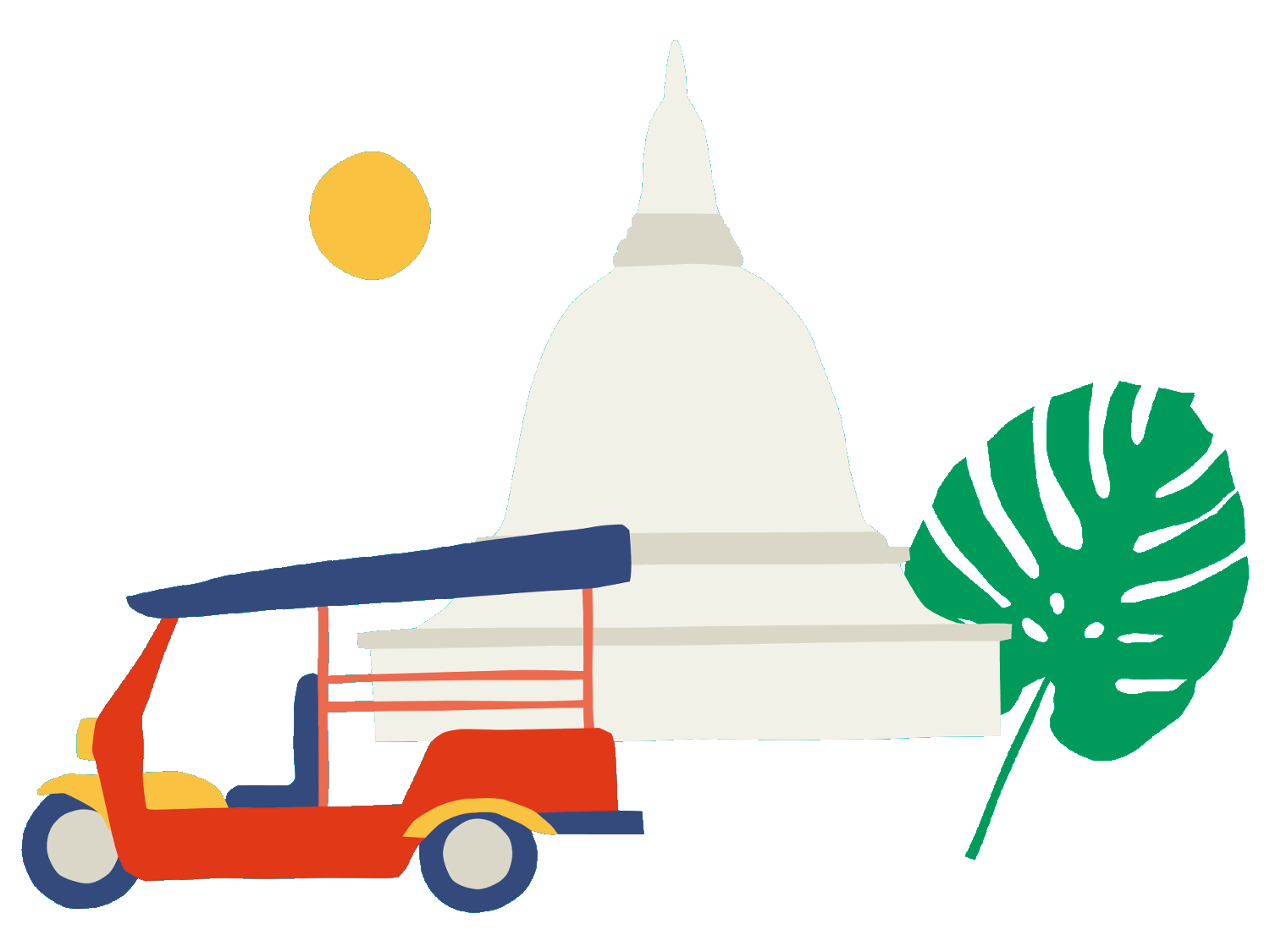
Nur an einem bestimmten Ort suchen?
Thailand Brunei Indien Indonesien Kambodscha Laos Malaysia Malediven Myanmar Philippinen Singapur Sri Lanka Vietnam
Bali Bangkok Hanoi Ho Chi Minh City Krabi Kuala Lumpur Luang Prabang Phnom Penh Phuket Siem Reap Singapur Yangon

Multiple Entry Visa Thailand: Thai Multi Entry Tourist Visa
Multiple Entry Visa Thailand is a type of Thai multi-entry tourist visa that is valid for entering Thailand unlimited times within 6 months from the date of issuance. The allowed period of stay with this Thailand visa is 60 days maximum per stay . However, you may enter Thailand again as long as the visa is still valid.

Thailand Multiple Entry Tourist Visa
Thailand Multiple Entry Tourist Visa can only be applied for at Thai embassy or consulate within the country of your legal residence .
Travel SMART! Get Thailand SIM Card with unlimited Internet much cheaper here: [SALE] SIM Card for Thailand (Airport Pick Up)
Documents for Multiple Entry Visa Thailand
When applying for Thailand Multiple Entry Tourist Visa you will need the following documents (list can slightly vary depending on embassy / consulate):
- Passport valid for at least one year from travel date of the first trip.
- Copy of the passport biodata page.
- Duly filled-in and signed Thai Visa Application Form that is filled online when applying via Thailand E-Visa website.
- One or two passport size (3.5 x 4.5 cm) photos taken within 6 months. Some Thai embassies require newer photos. It is important to note that if the photo does not reflect your current appearance you may be refused to enter Thailand.
- Visa fee (usually paid in cash) or a proof of fee payment confirmed by the bank (accepted payment options depend on embassy / consulate). Thai embassies using Thailand E-Visa system accept payments online via the system. The cost of this visa is currently 200 USD / 175 EUR / 5,000 THB or around that amount in local currency of the country, where specific Thai embassy or consulate is located.
- Return / onward journey air ticket for flying out of Thailand for the first visit. Some embassies / consulates now even require to present tickets at least for two trips to/from Thailand. Flights to Thailand can be booked here: Cheap Flights to Thailand
- Accommodation booking at least for the first visit. In most cases hotel booking for full first trip duration is required. It's best to book your hotel on Booking.com or Agoda as bookings on these online platforms are usually accepted with no problem.
- Proof of bank balance exceeding 200,000 THB (around 6,000 EUR) or roughly equivalent amount in local currency per person. You normally need to present a bank statement for 6 months and the balance each month needs to be at least the amount stated.
- Proof of employment or other occupation.
At the time of your arrival to Thailand, you will have to submit Thailand Arrival Card as well (currently only needed when arriving by land or by sea).
You might be requested to provide extra documents in addition to the ones mentioned above, e.g. proof of your residence, travel itinerary etc. Therefore, you should always check for the detailed list of required documents with the specific Thai embassy or consulate before making your Thai visa application there.
Thai Embassies / Consulates for Multiple Entry Tourist Visa
You can apply for Multiple Entry Tourist Visa only at Thai embassy or consulate within your resident country !
The residents of the United States can apply for Thailand Multiple Entry Tourist Visa at Thai embassy or one of Thai consulates, depending on their jurisdiction:
- Royal Thai Embassy in Washington, D.C - responsible for Alabama, District of Columbia, Delaware, Florida, Georgia, Louisiana, Maryland, Mississippi, North Carolina, South Carolina, Tennessee, Texas, Virginia, West Virginia, Puerto Rico
- Royal Thai Consulate General in Chicago - responsible for Arkansas, Illinois, Indiana, Iowa, Kansas, Kentucky, Michigan, Minnesota, Missouri, Nebraska, North Dakota, South Dakota, Oklahoma and Wisconsin.
- Royal Thai Consulate General in Los Angeles - responsible for Alaska, Arizona, California, Colorado, Hawaii, Idaho, Montana, Nevada, New Mexico, Oregon, Utah, Washington, and Wyoming as well as all of the unincorporated territories of the United States in the Pacific such as Guam.
- Royal Thai Consulate General in New York - responsible for Connecticut, New York, New Jersey, New Hampshire, Maine, Massachusetts, Ohio, Pennsylvania, Rhode Island and Vermont.
UK residents can apply for Multiple Entry Visa Thailand at Royal Thai Embassy in London .
Australian residents can apply for Thailand Multiple Entry Visa at Royal Thai Embassy in Canberra or Royal Thai Consulate General in Sydney .
Residents of the countries with no presence of Royal Thai Embassy or Consulate-General, can apply for Multiple Entry Visa Thailand in the country with the assigned Thai Embassy, e.g. Latvian residents can apply at Royal Thai Embassy in Stockholm (Sweden), Ukrainian residents can apply at Royal Thai Embassy in Warsaw (Poland), etc.
The process of Thai visa application might also be different as some of Thai embassies use Thailand E-Visa official website, others have their own online systems, some accept applications via Visa processing agents, while the rest still accept applications in person. As it was mentioned before, you should always check for the detailed list of required documents with the specific Thai embassy or consulate before making your Thai visa application there.
Thailand E-Visa Application
Thailand E-Visa Application service giving an opportunity to apply for Thai visa online is available. E-Visa service makes application for Thailand visa at Thai embassies and consulates much easier. However, Thailand E-Visa application system is still used just by some Thai embassies worldwide.
Thailand E-Visa application service is currently available for visa application in China , United Kingdom , United States and a number of countries in Europe. Check with your local Thai embassy if they require you to apply for Multiple Entry Visa Thailand via Thailand E-Visa official website.
Thailand Immigration control procedure at the airport in Thailand is briefly described here: Thailand Immigration Control Procedure for Foreigners .
Your stay in Thailand can be extended once per entry. In most cases it can be extended by 30 days. For more information check: Thai Visa Extension .
The application of a Multiple-Entry Tourist Visa seems to be not worth the effort? You can opt for one of the easier ways to visit Thailand - Free visa-exempt stay , Visa on Arrival or Single-Entry Tourist Visa .
Take the worry out of your arrival at Bangkok's Suvarnabhumi Airport after a long flight, and enjoy a VIP service through the airport formalities. Take advantage of a premium service that fast tracks you through immigration by booking it online here: Bangkok Suvarnabhumi Airport Fast Track Immigration Service .
Any Questions?
Check our Frequently Asked Questions about getting Thailand Visa at Thai Embassies and Consulates and ask your own question if it's not answered there yet.
FAQ - Thai Visa at Embassy / Consulate
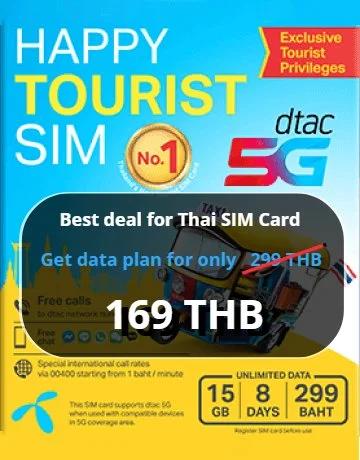
Popular on THAIest
Muay Thai Fights in Bangkok
Where to Stay in Bangkok?
Bangkok Hotels with Infinity Pools
Bangkok River Cruises
Full Moon Party Koh Phangan
Half Moon Party Koh Phangan
Koh Phangan Luxury Hotels & Resorts
Best Hotels in Chiang Mai Old City
Best Hotels in Ao Nang, Krabi
Phuket Pool Villas
We use cookies on our website. Some of them are essential for the operation of the site, while others help us to improve this site and the user experience (tracking cookies). You can decide for yourself whether you want to allow cookies or not. Please note that if you reject them, you may not be able to use all the functionalities of the site.
- Embassy officers
- Team Thailand Officers and Staffs
- Office Hours and Address
- Embassy Holidays
- Hall of Fame
- History of Embassy
- Le Pavillon Thailandais
- History of Ambassador Residence
- Announcement
- Do I need a Visa to enter Thailand?
- Tourist Visa
- Transit Visa
- Non-Immigrant Visa
- Diplomatic / Official/ UN Laissez-Passer / International Organization
- Thailand Elite
- Visa on Arrival (VoA)
- Long-Term Residents Visa (LTR)
- How to apply for Thailand E-visa
- Do I have to provide 'Yellow Fever Certificate'?
- How to enter Thailand under COVID-19 situation
- Document from SWITZERLAND
- Document from LIECHTENSTEIN
- Document from THAILAND
- Document from OTHER COUNTRIES
- List of Translators
- หนังสือเดินทาง/ Passport
- การขอสูติบัตร/ Birth Certificate
- การขอใบมรณบัตร/ Death Certificate
- การจดทะเบียนสมรส/ Marriage Certificate
- Changing Surname in the Civil Registration or Recording Family Status after Marriage
- การจดทะเบียนหย่า/ Divorce Certificate
- บัตรประจำตัวประชาชน/ Thai ID
- หนังสือมอบอำนาจ/ Power of Attorney
- หนังสือรับรอง/ Confirmation Letter
- การขอสละสัญชาติไทย
- คุ้มครองและดูแลผลประโยชน์คนไทยในสวิตเซอร์แลนด์/ Protection of Thai Nationals in Switzerland
- ประกาศสำนักงานราชบัณฑิตยสภา เรื่อง กำหนดชื่อประเทศ ดินแดน เขตการปกครอง และเมืองหลวง
- How to obtain Criminal Record from Thailand
- Children traveling without Parent(s) / Traveling with children (under 20 years old)
- Bringing corpses/human ash into Thailand
- Traveling with Pets
- Prohibited and Restricted Items to Bring into Thailand
- Carrying Medication into Thailand
- Bringing a Drone to Thailand
- E-Cigarette and Baraku
- Bringing money in or out of Thailand
- Importing Personal Vehicles into Thailand
- Working in Switzerland
- Clearing Swiss Customs
- ลงทะเบียนคนไทยในสวิตเซอร์แลนด์
- ข้อควรรู้ก่อนเลือกตั้ง
- ลงทะเบียนขอใช้สิทธิ์เลือกตั้งนอกราชอาณาจักร
- การเลือกตั้งทางไปรษณีย์
- บัญชีรายชื่อผู้มีสิทธิเลือกตั้งนอกราชอาณาจักร ประจำที่เลือกตั้งที่ สถานเอกอัครราชทูต ณ กรุงเบิร์น
- บัญชีรายชื่อพรรคการเมือง และผู้สมัครรับเลือกตั้ง ส.ส.
- การแจ้งเหตุอันไม่อาจไปใช้สิทธิเลือกตั้ง
- ประกาศ/คำสั่งที่เกี่ยวข้อง
- Scholarships from Thai Universities
- Thailand International Postgraduate Programme (TIPP) scholarships
- PhD Scholarships from NIDA
- Ramkhamhaeng University for Thais Abroad
- News & Activities
- Thailand's Economic Factsheet
- Switzerland Factsheet
- Thailand-Switzerland Relations
- Thai Monarchy and Switzerland
- Liechtenstein Factsheet
- Thailand-Liechtenstein Relations
- Vatican City Factsheet
- Treaty of Friendship and Commerce between Siam and the Swiss Confederation 1931
- Thai Associations
- Thai Temples
- List of Thai Language Schools in Switzerland
- Thai Language Learning Materials
Do I need a Visa to enter Thailand? Home > Do I need a Visa to enter Thailand?
Nationals of the following countries may enter Thailand without a visa f or tourism purposes only.
Visa Exemption :
1. Swiss passport holders entering Thailand for tourist purposes are entitled to enter Thailand for a period not exceeding 30 days without a visa under the Tourist Visa Exemption Scheme. Please note that Tourist Visa Exemption only applies to foreigners holding passports issued by the countries listed below . Other travel documents for foreigners issued by these countries are not acceptable. (See the complete list of eligible countries in the below table.)
2. Foreigners entering Thailand under the Tourist Visa Exemption category must provide proof of adequate funding for the duration of stay in Thailand at the port of entry (i.e., traveler’s cheque or cash equivalent to 20,000 Baht per person and 40,000 Baht per family), proof of onward travel (confirmed air, train, bus or boat tickets) to leave Thailand within 30 days of the arrival date. Otherwise, a tourist visa must be obtained.
3. Temporary passport / provisional passport/emergency passport of nationals exempted from the Visa Scheme for 30 days is accepted by the Immigration Bureau in Thailand. However, the passport must be valid for not less than six months upon returning to the residence country.
4. Travelers who enter Thailand under the tourist visa exemption category can apply for an additional extension at the Immigration Bureau of up to 30 days .
Holders of BLUE or GREEN passports issued by the Swiss government
is NOT entitled to enter Thailand under the Visa Exemption scheme.
Please see how to apply for a Visa for tourism purposes here .
Nationals entitled to a visa exemption (as indicated in the list below) are eligible to enter Thailand without a visa through land border checkpoints only twice a calendar year. Entering international airports will not be affected by this regulation.
Foreigners who enter Thailand under the Tourist Visa Exemption category and would like to leave and re-enter may only stay for a cumulative duration, which does not exceed 90 days and is within six months from the date of first entry. (Passport must be valid for six months upon returning to residence country).


Thailand Elite Visa 2023: A Comprehensive Guide with Latest Updates
Are you looking for an easy way to stay in Thailand? The Thailand Elite visa might be the best solution! The Thailand Elite visa offers a long-term stay option that allows visitors to stay in the country without any administrative hassle.
This 2023 guide explains everything you need to know about the Thailand Elite visa, including its benefits and how to obtain it for an unforgettable travel experience in Thailand.
What is the Thailand Elite Visa?
The Thailand Elite Visa is classified under the tourist visa category (Privilege Entry Visa “PE”) in Thailand. Designed for foreigners engaged in business, digital nomads, retirees, investors, and families looking to settle in Thailand, the Elite visa allows for a one-year stay in Thailand without any additional paperwork upon each entry into the country.
The Elite visa is a multiple-entry visa that is renewable for 5, 10, or 20 years , with an extendable stay duration of one year for each entry. The visa holder can have an uninterrupted stay in Thailand without the need to leave the country. Additionally, the member doesn't have to experience visa runs, visa conditions, paperwork, and immigration services for 5–20 years.
How to Become a Thailand Elite Member?
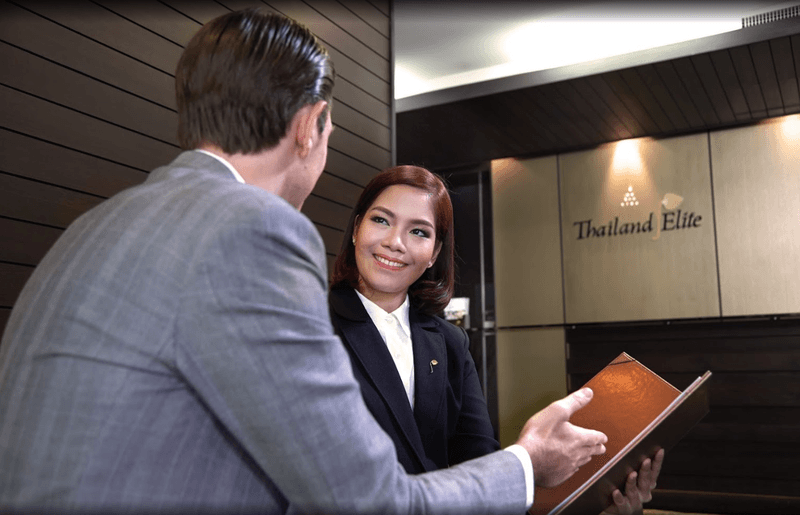
Applicants can apply from anywhere, and membership to Thailand Elite has no age restrictions, income requirements, or private medical insurance conditions. However, applicants are required to have and maintain the following qualifications:
- No visa overstay records in Thailand
- Be allowed to stay in Thailand in accordance with the immigration laws or any related law of Thailand
- Hold a foreign passport from an accepted country (citizen from an eligible country, non-sanctioned countries*)
- Not have been declared a person of unsound mind, incompetence, or quasi-incompetence; and
- Not have been sentenced by a judgment of imprisonment in any countries (except for an offense committed through negligence)
The Thailand Elite membership application process is simple and secure , with very few documents required : a passport copy, membership application form, and a passport-sized photo. The entire process can be achieved through the online application portal or by email. Once the application is approved, an approval letter will be sent, along with a guide on how to pay the Thailand Elite Visa program membership fee. Once the Thailand Elite office receives full payment, they will issue an Elite member number, which means the applicant's visa is ready to be affixed.
Where will I receive my Elite Visa?
Your Thailand Elite visa will be affixed to your passport (a minimum of 3 pages is required) at:
- Airports (Bangkok Suvarnabhumi or Phuket airport) upon arrival of the international flight
- Immigration at Bangkok Chaeng Wattana
- Royal Thai consulate in your country of residence
Refer to the detailed application process on this page: How to Become a Thailand Elite Member?
What are the advantages of Elite visa?
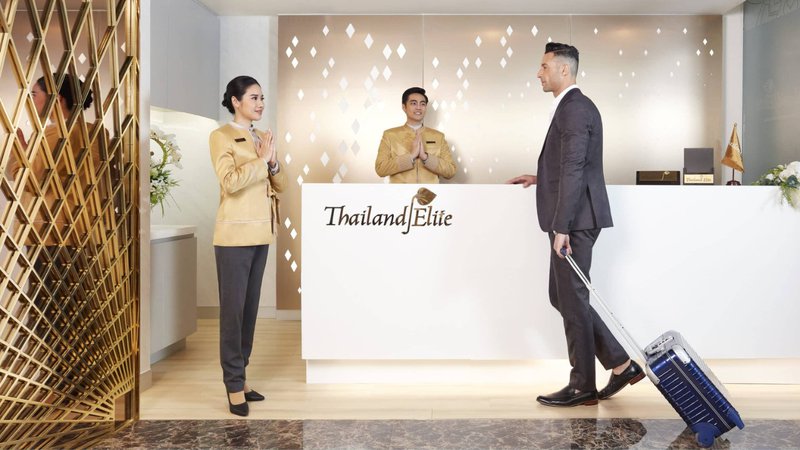
The Elite visa comes with benefits depending on the chosen membership:
- The member does not have to experience visa runs, visa conditions, extensions, paperwork, and dealing with immigration services for 5 to 20 years.
- VIP escort by EPA upon arrival and departure, round-trip limousine service between the airport and residence/hotel.
- Exclusive access to airport lounges and concierge services and accelerated processing of passports and immigration procedures.
- Personalized assistance for the 90-day reporting.
- Simplification of banking operations in Thailand.
- Free annual health checkup in selected international hospitals.
- Exclusive access and discounts to spas, golf courses, hotels, travel agencies, cooking schools, department stores, Muay Thai gyms, and other leisure activities.
- Exemption from taxes on any income earned outside Thailand.
- Possibility of obtaining a tax identification number.
- Assistance in obtaining a driver's license.
- 24/7 customer service assistance.
How much does the membership cost?
The membership fee depends on the chosen membership package. Each Thailand Elite membership package has different benefits, validity, and cost:
Elite Easy Access (individual membership)
- Membership validity: five years
- Membership fee: THB 600,000 NET (approx. €16,520/$16,550)
- No age limit and anyone can apply
- Membership upgrade: with an additional THB 400 000, you are entitled to upgrade to Elite Superiority Extension's 20 years program
- Non-transferable/non-refundable
Click here to see all details about the program: Elite Easy Access
Elite Family Excursion (family membership)
- Membership: At least two persons from the same family
- Validity: five years
- Membership fee: THB 800,000 (VAT Included) for 2 persons (THB 400,000 each)
- Additional member fee: THB 300,000 for each additional member
- Conditions: married couple OR Children OR Parents of the principal member (proof required such as a marriage certificate or birth certificate)
- Additional member validity: valid for a period equal to the remaining duration of the principal member
- If you want a family member to have their own Thailand Elite Visa membership, getting this package instead of having 2 Elite Easy Access memberships can save you THB 400,000.
Click here to see all details about the program: Elite Family Excursion
Elite Privilege Access
- Membership validity: ten years
- Membership fee: THB 1,000,000 NET (VAT Included)
- Additional validity : valid for a period equal to the remaining term of the core member
- Additional membership fee: THB 800,000 (VAT Included) / each
Click here to see all details about the program: Elite Privilege Access
Elite Family Alternative (individual & family membership)
- Membership validity: 10 years
- Membership fee: THB 800,000 (VAT Included)
- Additional member fee: THB 700,000 / each
- Additional member validity: valid for a period equal to the remaining term of the core member
Click here to see all details about the program: Elite Family Alternative

Elite Superiority Extension (individual membership)
- Membership validity: 20 years
- Membership fee: THB 1 million (approx. €27,500)
- This is the most economical membership formula over the long term.
Click here to see all details about the program: Elite Superiority Extension
Elite Ultimate Privilege (individual & family membership)
- Membership fee: THB 2 millions
- Transfer fee: 20% of Prevailing Rate*
- Annual fee: THB 20,000*
- This is the membership that offers the most benefits and privileges
Click here to see all details about the program: Elite Ultimate Privilege
The Elite Visa offers a wide range of benefits and privileges, allowing you to stay in the country without constraints. Select the membership that best suits your needs and take advantage of all the benefits it offers. If you have any questions or need additional information, feel free to contact us.
What's your reaction?
The top 5 most beautiful beaches in thailand, complimentary night stay at anantara vacation club maikhao, phuket for new thailand elite members, you may also like.

Thailand’s Daycation Scene: A Blend of Luxury, Leisure, and Adventure
Daycation delight: the emergence of luxurious retreats in thailand for a tranquil escape.

Unveiling Thailand’s Lavish Secrets: Your Guide to Elite Travel Experience in 2024
More in: non classé.

Retiring in Paradise: Expat Experiences and Expert Tips for a Blissful Retirement in Thailand
Embarking on a Luxurious Yachting Adventure: Island Hopping in Thailand 2024

Thailand’s Golfing Elysium: Discover Luxury at World-Class Golf Resorts in Paradise
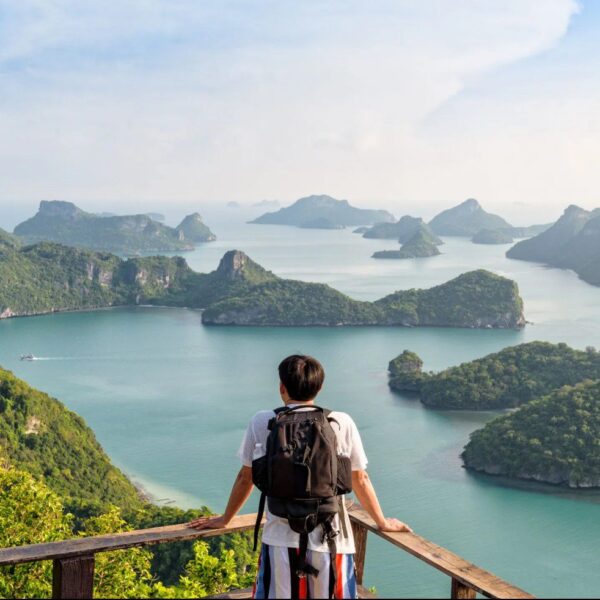
Thailand’s 2024 Delights: Helicopter Adventures, Exclusive Private Islands, and Hidden Treasures
Comments are closed.
RECENT ARTICLES

Retiring in Thailand on a Budget: A Guide to Cost of Living for Retirees

DESTINATIONS

Top 7 Spas in Bangkok for Ultimate Relaxation

Embarking on a Cultural Odyssey: Exclusive Thai Art and Cultural Experiences

Thailand Toned Down Nationwide COVID-19 Controls on June 1, 2022.

Bangkok and Chiang Mai are Named among the Top Ten Destinations in the World in the ‘World’s Best Awards 2021’
Lost your password?
- Destinations
- Real Estate
Latest Posts
Popular tags.

This website is managed by Siam Legal International - a law firm in Thailand

How to get a Thailand Elite Visa 2024
Out of all the countries within the ASEAN sphere, Thailand stands out as among the most majestic and enthralling nations. Appropriately earning its moniker as the Land of Smiles, Thailand has captivated the minds of foreigners across the globe and inspired millions to either visit or immigrate here at some point. Looking for the ideal visa is a goal many are seeking to achieve.
Introducing the Thailand Elite Visa, it is a top-of-the-range visa aimed at promoting longevity and prestige to foreigners looking to move to Thailand. This is a type of privilege entry visa allowing foreign nationals to stay for either 5, 10, 15, or 20 years within Thailand, rewarding them with glamorous benefits and introducing them to the privilege points system.
There are many reasons why getting a Thai Elite Visa is so enticing to foreigners interested in Thailand, either to establish residence there, travel, or more such as:
- The use of privilege points allows for members to spend on any privileges of their choice, offering them more flexibility.
- Applying for an Elite Visa is very straightforward and quick, lacking the pitfalls present in other tourist visa applications.
- Members are entitled to 5-year multiple-entry visas, its amount and renewability dependent on the membership applied for.
- Members are able to fast track their immigration at airports in Thailand via the premium lane service.
- Members can request for assistance (such as opening a bank account or for the 90 day reporting service) via the member contact center hotline.
- Members are greeted upon arrival in Thailand by an Elite Personal Assistant (EPA).
To be a member of Thailand Elite, an application for a Thailand Elite Visa needs to be completed. Here is a step-by-step guide on how to apply for your Elite Visa and what the Thailand Elite application entails. With this information at your fingertips, you will not need to worry about trying to gain residence in or just simply visiting Thailand.
Step 1: Consult a GSSA to Apply for a Thai Elite Visa
(1) pick a general sales and services agent (gssa) to support you on the visa application:.
A Thailand Elite appointed General Sales and Services Agent (GSSA) is highly recommended for a Elite Visa applicant for these reasons:
- They can answer inquiries on anything Thailand Elite related, host consultations, provide advice, review documents, and submit the visa application on your behalf through their services.
- They can ensure that your application is correct and is properly submitted.
- GSSAs appointed by Thailand Elite make sure applicants do not run into issues during their application.
As payment is made to Thailand Elite in order to apply, most GSSAs do not accept additional payment for their services. If you consider Siam Legal as your primary GSSA for instance, we offer to submit your membership application and meet with you for a consultation session, free of charge. We can also provide the much requested immigration services and support, as well as ease your immigration journey into Thailand.
(2) Consider which Elite Visa membership you’d like to apply for:
Thai Elite Visas are grouped into 3 available memberships, each with their own share of tailored privileges. The 20 year RESERVE package , priced at 5 million THB is unfortunately the only membership available to applicants via invitation, targeted at a limited pool of applicants.
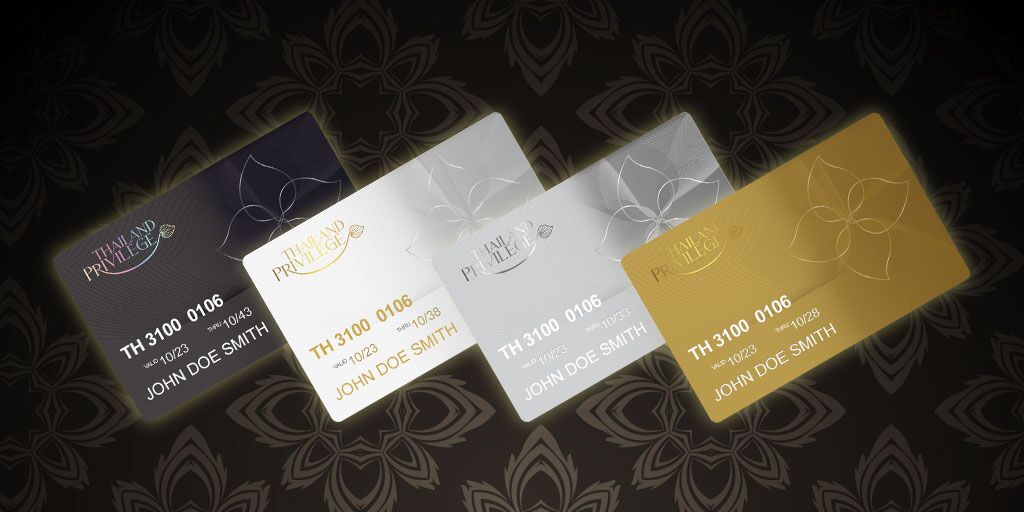
- Cost: 900,000 THB per applicant.
- Privilege Points: 20 per year.
- Membership Validity: 5 years. Provides a 5-year multiple-entry visa.
- Upgradable to a 10-year PLATINUM or 15-year DIAMOND Membership.
- Cost (main applicant): 1.5 Million THB.
- Cost (additional applicants): 1 Million THB.
- Privilege Points: 35 per year.
- Membership Validity: 10 years. Provides two 5-year multiple-entry visas, renewable once.
- Upgradable to a 15-year DIAMOND Membership.
- Cost (main applicant): 2.5 Million THB.
- Cost (additional applicants): 1.5 Million THB.
- Privilege Points: 55 per year.
- Membership Validity: 15 years. Provides three 5-year multiple-entry visas, renewable twice.
- Cannot be upgraded.
During a meeting with a Thailand Elite appointed GSSA, the consultant will provide you with a rundown of each of the available membership packages, giving you time to decide on which one is perfect for you. Once you have made a decision, simply select a membership to move on to the next step.
(3) Understand the Thailand Elite requirements needed to be eligible for the visa:
Much like most other visas, certain eligibility requirements* need to be met for obtaining the visa and to become an official member of Thailand Elite. To be eligible, applicants must meet the following before applying for the membership:
- Hold a foreign passport valid for at least 1 year (365 days) or more.
- Not visit Thailand for the purpose of studying, working, or setting up a business.
- Be of sound mind and competence.
- Harbor no history of criminal activity, blacklists, bankruptcies, and/or long overstays.
- Not be a current or previous holder of a Thailand Volunteer Visa.
- Not be a current or previous holder of a (non-legitimate) Thailand Education (ED) Visa.
- Not be a national of a country on the UN Sanctions List**.
*NOTE: A detailed list of all requirements are also shown on the first page (also known as the consent form) of the membership application form.
**NOTE: If the applicant is a dual national, with one country on the UN Sanctions List and the other country not on the list, they can still apply to be a member provided they use the passport of the country that is not restricted.
(4) Understand the Thailand Elite membership restrictions and guidelines before applying for the visa application:
There are some restrictions that aspiring members should keep in mind and some guidelines to follow prior to applying for a Thailand Elite Visa:
- Members cannot work for a company in Thailand or apply for a Thai work permit.
- Members cannot establish a business (especially one requiring workers to hold a Thai work permit) or sell goods or services in Thailand.
- A member cannot hold an Elite Visa and a non-immigrant visa simultaneously while in Thailand.
- Members are still subjected to mandatory 90-day reporting every 3 months while in Thailand.
- A member is only allowed to stay in Thailand for 1 year per arrival. You can reset this by simply leaving the country and returning the next day, or requesting an extension at the immigration office.
(5) Book a consultation session with your GSSA regarding the Thailand Elite Visa (for information on the package, whether its a good investment, etc):
If you have chosen Siam Legal as your primary Thailand Elite GSSA for instance and are ready to begin applying for the Thai Elite Visa of your choice, you can contact them to request for a free consultation service. Consultation services pertaining to Thailand Elite are held either in-person* in Thailand (such as at the main Bangkok office) or online.
Booking a consultation with the Thailand Elite is always recommended especially for new applicants:
- You can receive detailed advice from the Thailand Elite department on which membership to apply for.
- You can get all inquiries or concerns answered directly on the spot by a member of the Thailand Elite team.
- You will receive in-depth information on the application process for the membership by a consultant from the Thailand Elite team.
- There is more convenience as all forms can be filled under the guidance of the consultant, your photograph will be taken and your passport will be photocopied all on-site.
*NOTE: For in-person Thailand Elite consultation services such as at Siam Legal’s Bangkok office, a passport is the only required document you will need to bring with you.
Step 2: Gather all required documents for the Thailand Elite Visa application
You will need to submit the following documents for the membership application:
(1) Completed and signed Thailand Elite application form:
- Choose the membership package and download the application form for that membership. If you are attending an in-person consultation, the form will be provided on-site.
- Sign the very first page of the membership application form. This is known as the consent form.
- Fill out the general details, contact information, occupation, and “other” section on the next page. During an in-person consultation, only the occupation section needs to be filled out.
- Sign the “applicant’s signature” field on the bottom of pages 2, 3, 4, 5, 6, and 7.
NOTE : All signatures on the membership application form must match your passport’s signature.
(2) Signed Personal Data Protection Act (PDPA) form for applicants:
- Procure the PDPA form for the membership application. If attending an in-person consultation, the form will be provided during the session.
- Sign the very last page (page 8) of the PDPA form.
NOTE : The signature on the PDPA form must match your passport’s signature.
(3) Photocopy of your passport:
- Check your passport to ensure it is valid for at least 1 year (or 365 days) or over.
- Scan the biopage of your passport. Ensure that the photocopy is in color and your passport’s signature is visible. If you are attending an in-person consultation, the consultant will photocopy it for you.
- Scan the signature page of your passport. (Only if the signature is not visible on your passport’s biopage)
- Scan the page of your passport showing your last Thai visa (or arrival stamp). (Only if you are in Thailand at the time of the application)
(4) Passport-sized photo of yourself:
Produce a photo of yourself in color and against a white background:
- You can photograph yourself using your phone’s camera in portrait mode.
- If you are attending an in-person consultation, the consultant will take your photo before concluding the session.
- If you have copies of passport-sized recent photos of yourself already, you can submit these for the Thailand Elite application instead.
(5) Supplementary documentation (if applying with a family member):
- Consider who is applying with you for the Thailand Elite membership.
- Submit the required documents depending on the person accompanying you:
- If a spouse is being added, you should submit a marriage certificate.
- If a child or parent is being added, submit a birth certificate.
If you have decided to use the services of a Thailand Elite GSSA such as Siam Legal, the necessary forms for the membership will be provided for you either during the consultation (or sent to you via email, WhatsApp or LINE). If you have booked an in-person consultation, you will be provided the forms to sign towards the end of the session and a staff member will also take your photo as well as photocopy your passport for you.
Step 3: Submit your application for the membership
There are two ways to submit the membership application:
- You can send in all your required documents over to Siam Legal (or a local Thailand Elite GSSA) via email. Siam Legal can also receive documents through WhatsApp and LINE. A consultant from the Thailand Elite department will submit and share your application with the Thai Immigration Authorities to begin the next stage of the application.
- You can attend an in-person consultation to get all documents prepared for the application on-site. The consultant will collect the papers at the end of the consultation and submit them on your behalf.
Upon submitting the application, you will receive an email confirming you of the submission along with some login details. These details will include a username and password to track the status of your Thailand Elite Visa application within an exclusive online portal .
Step 4: Complete the background check to meet requirements
Upon submission, the application will be sent over to the Thai Immigration Authorities where a background check will be conducted. During this, the applicant will be assessed based on their:
- Criminal record history.
- Bankruptcies.
- Removal orders, overstays and/or blacklists.
- History of ED visas (if not genuine) and/or volunteer visas if they visited Thailand in the past.
Processes usually last less than 4 to 6 weeks, depending on the immigration and background history of the applicant. Officers will assess their history not only in Thailand, but also in other countries too. The applicant will be notified via email on the approval or rejection of their background check. If approved, the applicant will receive an approval letter and an invoice to pay their fees over to Thailand Elite.
Step 5: Pay the membership fees to Thailand Elite
The next stage is to pay the one-time membership fee to Thailand Elite. The invoice has instructions on how to pay the fee and the Thailand Elite account the payment should go towards. You have only 30 days to pay the fee over to Thailand Elite upon receiving the approval letter and invoice.
Thailand Elite accepts the following payment methods:
- Debit/credit card.*
- Mobile banking.
- Banking transfer.
- Payment by cash.**
*NOTE: Links to pay the fee can be requested from your local Thailand Elite GSSA.
**NOTE: Payment for the fee in cash must be made in Thai Baht only and can only be transferred via a local Krung Thai bank in Thailand.
Step 6: Affix your new Thailand Elite visa to your passport
Once you have paid the fee, in about 5 to 10 working days, you will receive an email with two items in it: a welcome letter and your membership ID. Congratulations, you are officially a member of Thailand Elite.
Once you are in receipt of these, you can get your new visa affixed to your passport. The start date of your membership begins the moment you receive your membership ID.
You can affix your new Thailand Elite visa to your passport at these locations:
- Immigration Office on Chaeng Wattana Road, Bangkok (if in Thailand).
- Suvarnabhumi International Airport in Bangkok or Phuket International Airport (if abroad).
- The nearest Thai Embassy or Royal Thai Consulate (if abroad).
While optional, you can also request for a physical Elite Card to be issued, making it more convenient when wanting to access or use certain privileges while exploring every nook and cranny of Thailand. Present the card to certain establishments to gain access to their privileges and services. A card can be issued either at the locations above or be sent directly to your address and requires a 2 month window.
Step 7: Enjoy your new Thai visa and all its privileges
You now have an Elite Visa. As a member of Thailand Elite, you now have free reign over all the baseline privileges and benefits as well as access to the yearly privilege points. You can now spend a point or two to obtain a particular privilege. With all these and more at your fingertips, you’ll be able to feel like a celebrity upon arriving in Thailand. Enjoy unlimited entries in and out of the country, and no requirements to renew your visa every year to stay in Thailand along with other benefits.
While having a Thailand Elite Visa does not permit you access to permanent residency within the Land of Smiles or allow you to acquire a work permit, it can influence your decision to turn Thailand into a secondary home in the future. Maybe years later you might want a non-immigrant visa to get that work permit you always wanted because you managed to see what the country is really like on that Thailand Elite Visa. Regardless of your choices, having a Thailand Elite Visa is a great investment, especially if you desire privileges that justify the fee you paid and to show your elite privilege status within the country to your friends.
To know more about which Thailand Elite Visa suits your needs, please fill out the form below and submit.
- I consent to having this website store my submitted information so they can respond to my inquiry. See our Privacy Policy .
Related Posts
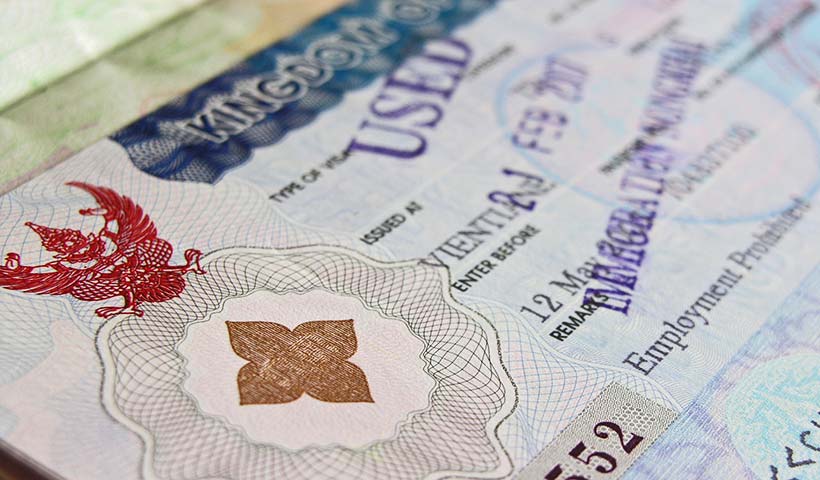
Thailand Marriage Visa
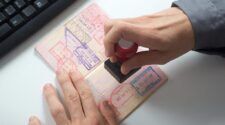
Thailand and China Set for Visa Waivers from March 1

How to Check the Status of Thailand Elite Application

Couples Retiring in Thailand Under the Thai Retirement Visa
Leave a comment cancel reply.
Your email address will not be published. Required fields are marked *
This form collects your name, email and content so that we can keep track of the comments placed on the website. By submitting this form, you accepted and agreed on our privacy policy and terms .

IMAGES
VIDEO
COMMENTS
Attention : E-Visa applicants are no longer required to submit passports and supporting documents in person at the Royal Thai Embassy/Consulate-General. It is important to note that you are only able to apply if you currently not in Thailand and in the countries where e-Visa services are available.
When you visit Thailand for the purpose of leisure, sight-seeing, and personal enlightenment, you are a tourist. A tourist is not allowed to work or conduct business in Thailand. A tourist needs a tourist visa so he/she can stay in Thailand for a period of more than 30 days while doing his/her own explorations and excursions in the kingdom. Due to COVID 19 pandemic most foreigners are now ...
The tourist visa must generally be used within 90 days from the date of issue and allows an initial stay of 60 days. After arrival in Thailand, a tourist visa may be extended at the discretion of an immigration officer once for an additional 30 days with the total period of stay no longer than 90 days. There is a 1,900 Baht fee for the extension.
A Single Entry Tourist Visa allows foreign nationals one entry into Thailand for tourism, leisure, or medical reasons. It is perfect for those who are looking to relax or maybe complete a scuba diving or Muay Thai training course. People can enter either by air, land, or sea. The visa has a 3-month validity from the time of approval.
Tourist Visa (TR) hier beantragen / apply here. Ihr Visaantrag wird innerhalb von 15 Konsulatstagen des Königlich Thailändischen Generalkonsulats bearbeitet (Montag bis Freiteg sind 5 Tage, an Wochenenden und konsularischen Feiertage arbeiten wir nicht). Der Visumantrag wird nur in der Reihenfolge des Eingangs bearbeitet.
Here are the prices of different Thai visas. Book cheap flights to Thailand . Tourist visas. Thailand tourist visas are priced as below. single-entry Thailand visa (3-month validity): USD 40; multiple-entry Thailand visa (6-month validity): USD 200; Non-Immigrant visas
Foreigners entering Thailand are required to apply for a tourist visa. Supporting documents for the application are the following: Passport or travel document with validity of not less than 6 months; A completed and signed visa application form. Two 2½-inch photos taken with in the past 6 months, with no hat and no sunglasses;
Visa processing is subject to visa service fees for each type of visa, as follows: Non-Quota Immigrant Visa: 1,900 baht for Single and 3,800 baht for Multiple. Source: Immigration Division 1. Tel. 0 2141 9889, 081 412 9180.
Photo: Freepik. A tourist visa in Thailand is an official travel document granted by the Thai government to foreign nationals who wish to visit the country for tourism purposes for a specific period. This visa allows travelers to enter and stay in Thailand for a limited period, typically 60 days for a single-entry tourist visa or multiple 60-day stays within six months for a multiple-entry ...
Tourist Visa (TR) may be granted to visitors who intend to stay in Thailand no longer than 60 days for tourism purpose Types of Tourist Visa and Validity: Single-Entry Tourist Visa: valid for entering Thailand once within 3 months from the date of issue. The period of stay is 60 days maximum. Multiple-Entry Tourist Visa: valid for entering Thailand within 6 months from the date of issue. The ...
Alle Infos zu den Kosten für dein Thailand-Visum. Die 30-tägige Einreiseerlaubnis kostet dich nichts, bei der Beantragung eines E-Visums hingegen fallen folgende Gebühren an: ... 3 Monate nach Thailand und wollten nun das Tourist Visa (TR) für 60 Tage beantragen. Dieses wollten wir dann vor Ort beim Immigration-Büro +30 Tage verlängern ...
Multiple Entry Visa Thailand is a type of Thai multi-entry tourist visa that is valid for entering Thailand unlimited times within 6 months from the date of issuance. The allowed period of stay with this Thailand visa is 60 days maximum per stay.However, you may enter Thailand again as long as the visa is still valid. Thailand Multiple Entry Tourist Visa
Tourist (6 months validity / Up to 60 days / Multiple Entries) 150: 4. Non-Immigrant (3 months validity / Up to 90 days / Single Entry) 60: 5. Non-Immigrant (1 year validity / Multiple Entries) ... on visa fees exemption with Thailand . 1. Malaysia 2. The Philippines (visa fee exemption for stay of not exceeding 59 days) 3. Singapore 4. ...
1.3 Tourist Visa for Tourism and Leisure Activities (TR1) Period of stay: Not exceeding 60 days. Validity of visa sticker. 90 days (single entry) / 180 days (multiple entries) Extension: Possible for up to 30 days at the immigration office in Thailand. Visa Fee: 40 CHF (single entry) / 180 CHF (multiple entries)
For the Non-Immigrant O visa (retirement), proof of retirement funds is a key requirement. A steady income shown either verified by the Embassy in Bangkok or directly deposited in your Thai Bank account are also important prerequisites. You may also consider changing from tourist to student: the Non-Immigrant ED (Student) visa.
Tourist Visa Exemption . Passport holders of the countries listed for visa exemption are not required to obtain a visa when entering Thailand for tourism purposes and will be permitted to stay in Thailand for a period not exceeding 30 days on each visit.. From 1 October 2022 to 31 March 2023, the period of stay for tourist visa exemption scheme is extended from 30 to 45 days.
No annual fee. Thai Elite Visa holders can upgrade to the Elite Superiority Extension or Elite Ultimate Privilege package. Elite Family Excursion (minimum of 2 people) Five-year Thailand Elite Visa validity. Fee: THB 800,000 ($23,200) plus THB 300,000 ($8,700) for each additional family member. No annual fee.
The Thailand Elite Visa is a long-term visa given to the Thailand Privilege Card members. It is categorized under Tourist Visa (Privilege Entry Visa "PE") allowing residency in Thailand along with benefits for a period between 5, 10, or 20 years depending on the chosen package in exchange for a membership fee. This visa is a 5-year renewable multiple entry visa with an extendable 1-year ...
A Multi-Entry Tourist Visa allows foreign nationals unlimited entry to Thailand over a 6-month period. It is issued to people who visit the country for tourism, leisure, or medical purposes. A multi-entry visa allows the holder to stay in Thailand for up to 60 days per visit.
Nationals of the following countries may enter Thailand without a visa f or tourism purposes only.. Visa Exemption : 1. Swiss passport holders entering Thailand for tourist purposes are entitled to enter Thailand for a period not exceeding 30 days without a visa under the Tourist Visa Exemption Scheme. Please note that Tourist Visa Exemption only applies to foreigners holding passports issued ...
The Elite visa is a multiple-entry visa that is renewable for 5, 10, or 20 years, with an extendable stay duration of one year for each entry. The visa holder can have an uninterrupted stay in Thailand without the need to leave the country. Additionally, the member doesn't have to experience visa runs, visa conditions, paperwork, and ...
The Thailand Privilege Visa, also known by its previous name as the Thailand Elite Visa, is a long-term visa administered by the Thailand Privilege Card Co., Ltd., a fully-owned subsidiary of Thailand's Ministry of Tourism and Sports. It grants members a multiple-entry visa good for 5-20 years or more,
Step 2: Gather all required documents for the Thailand Elite Visa application. You will need to submit the following documents for the membership application: (1) Completed and signed Thailand Elite application form: : All signatures on the membership application form must match your passport's signature. (2) Signed Personal Data Protection ...